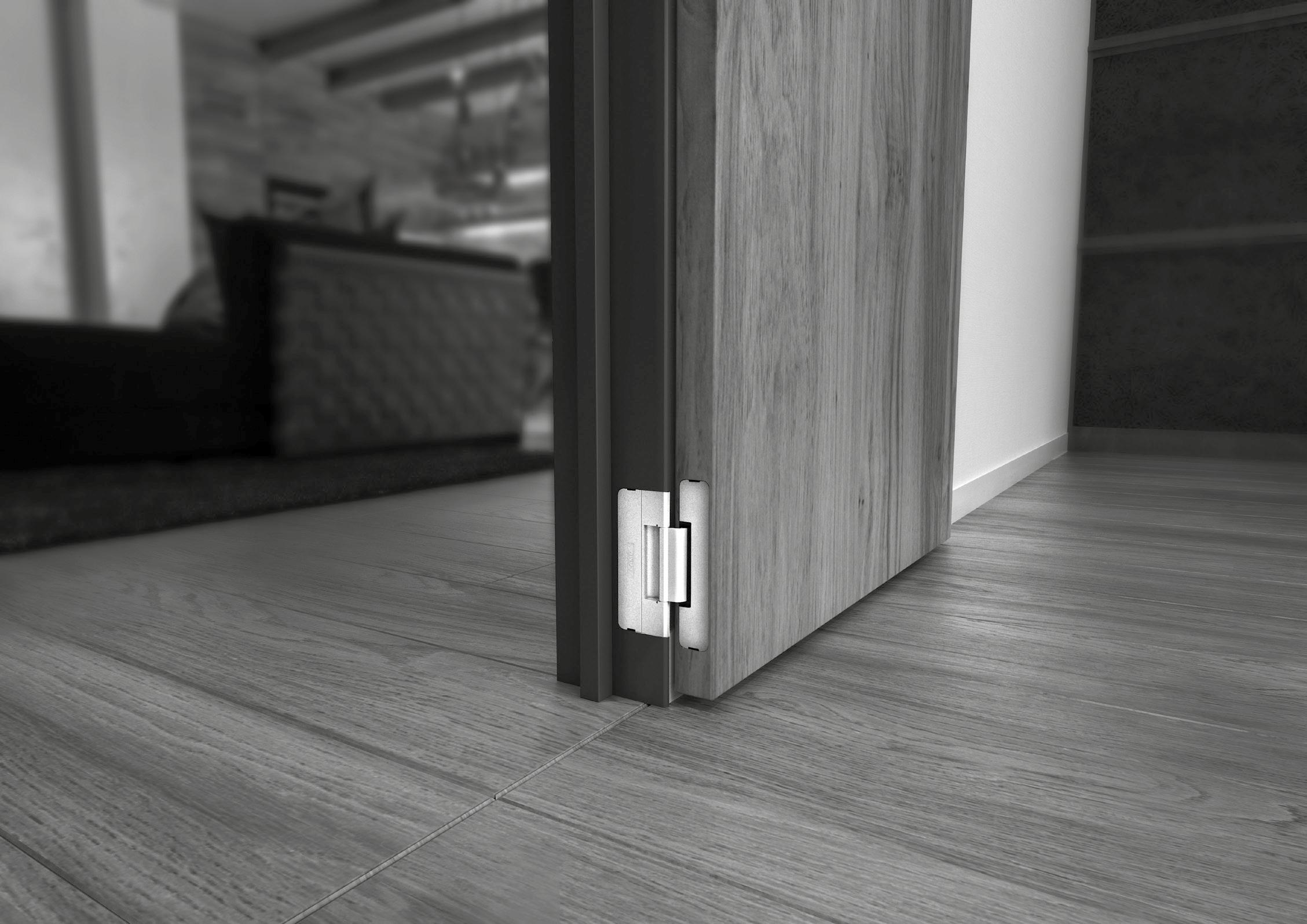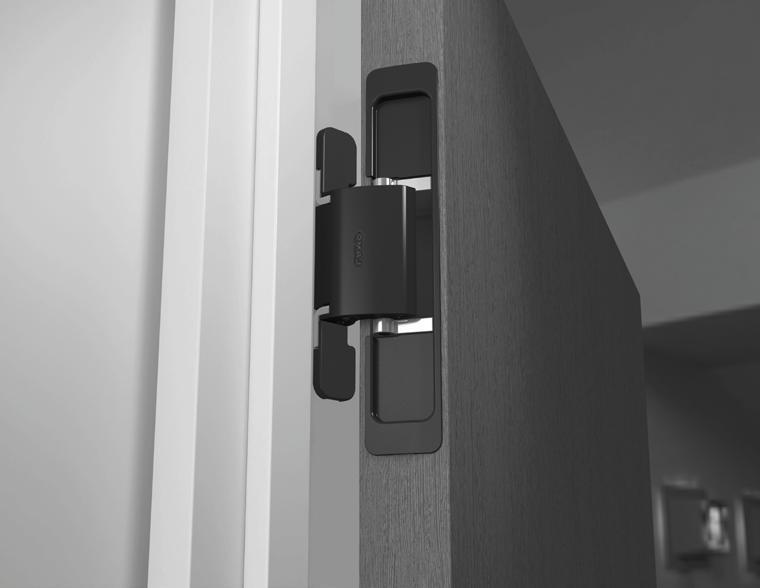
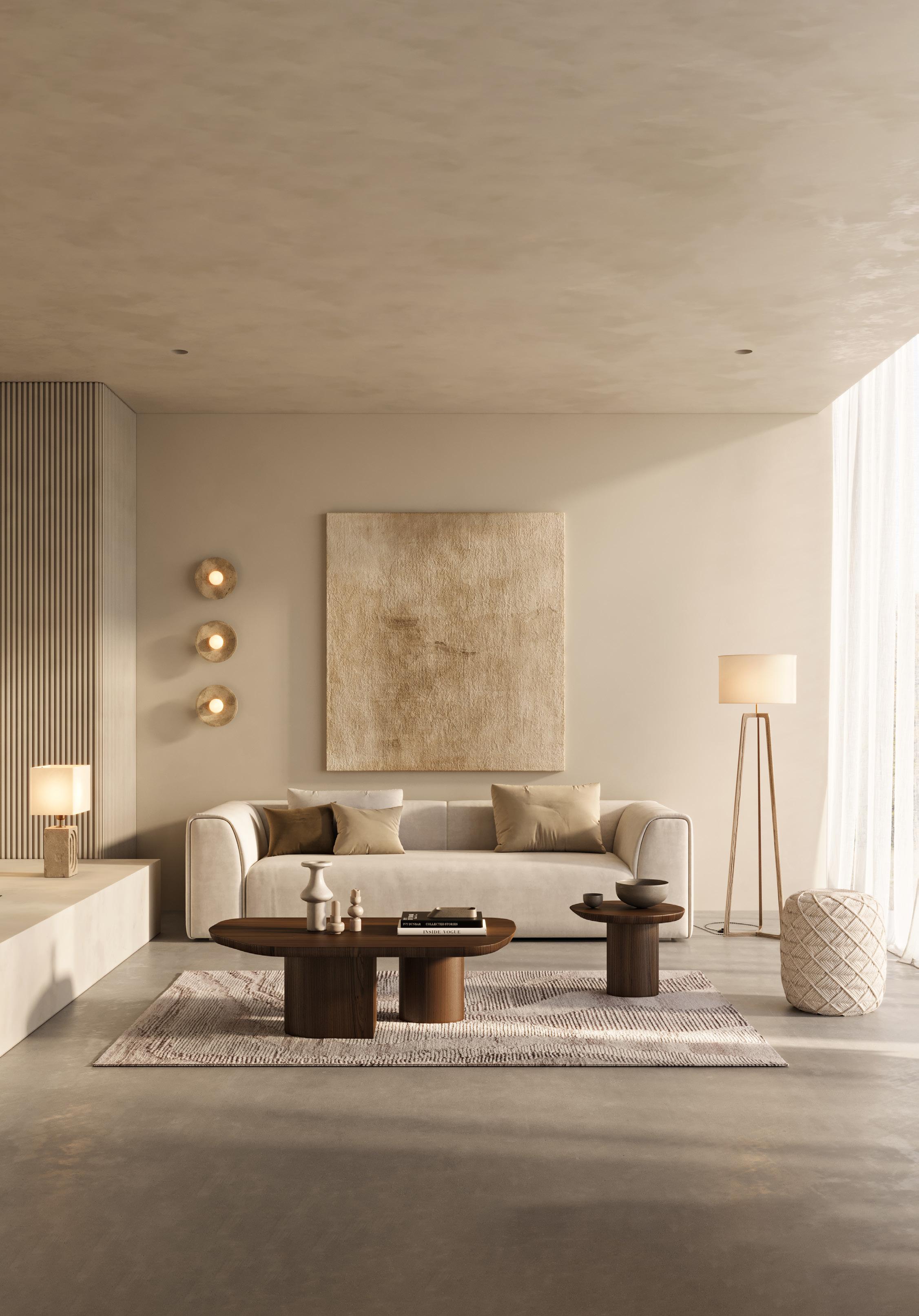




Editor – Maria Lapthorn maria@lhmagazine.co.uk
Editorial Assistant – Sophie Weir editorial@lhmagazine.co.uk
Production/Design – Laura Whitehead laura@lhmagazine.co.uk
Sales Executive – Sophie Evans sophie@lhmagazine.co.uk
Admin Assistant – Jade Still jade@lapthornmedia.co.uk
Accounts – Richard Lapthorn accounts@lhmagazine.co.uk
Circulation Manager – Leo Phillips subs@luxuryhospitality.co.uk
Publishing Director – Paul Attwood paul@lhmagazine.co.uk
Lapthorn Media Ltd 5-7 Ozengell Place Eurokent Business Park Ramsgate, Kent CT12 6PB 01843 808104

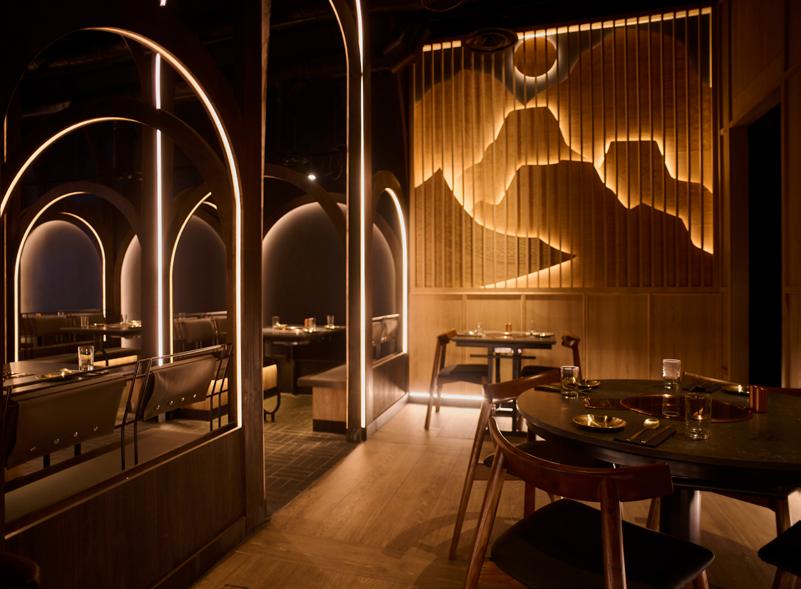
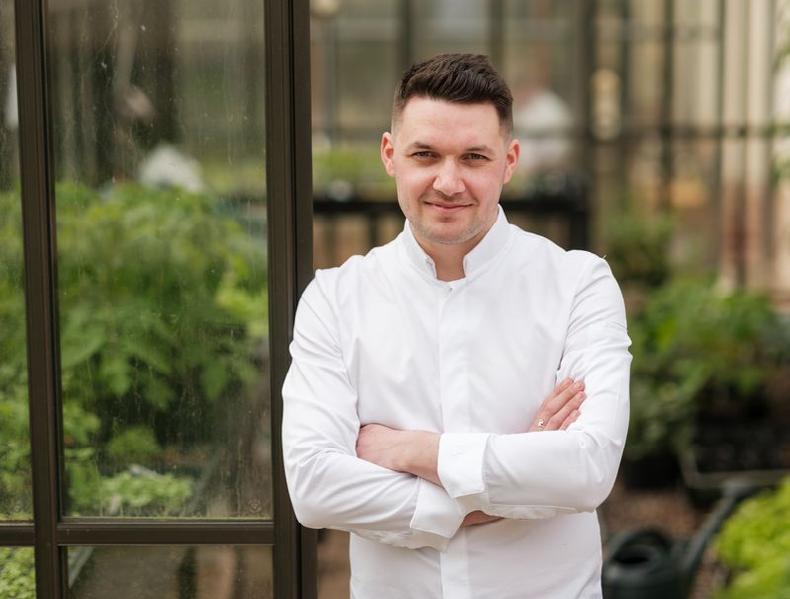

Company News 04 - 05, 06
Interiors - A Year in Design: Colours, Textures and Quiet Luxury 08
Supper Club Seduction 09
Review - Claro, St James’s 14 - 15, 16 - 17
Every effort is made to ensure the accuracy and reliability of material published in Luxury Hospitality Magazine. However, the publishers accept no responsibility for the claims or opinions made by advertisers, manufacturers or contributors.
No part of this publication may be reproduced or transmitted in any form or by any means, mechanical, electronic (including photocopying) or stored in any information retrieval system without the prior consent of the publisher.

Food & Drink - SOOM Serves Up Korean BBQ in Covent Garden 18
Latest Openings 22 - 23, 24
Tork 25
Editor's Review - Arctos Lapland 28
The Adventure Edit 30
Interview - From Moor Hall to Woodford Valley: A Conversation with Chef Jordan of The Great Bustard 32 - 33, 34
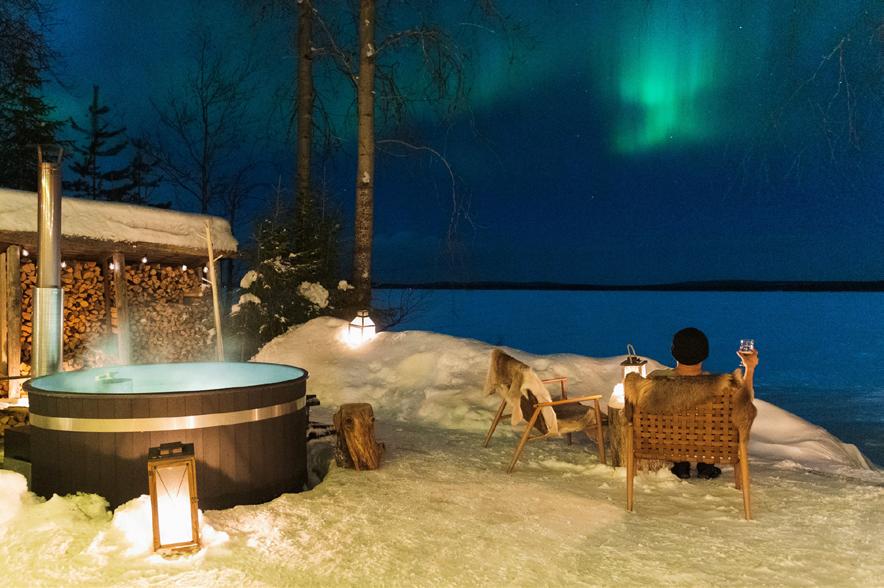
Events & Awards News 38 - 39
Technology & Software - Maximising Hospitality Profitability with Smart Technology 40
Review - Noci, Islington: Autumnal Light with Inventive Italian Dining 42 - 43
Industry News 44 - 45
In The Spotlight - Decades of Dedication: The Heart and Heritage of Mallory Court 48 - 49
Opinion Piece - Beyond Recipes: Training Chef-Managers 52 - 53
People on the Move 54

Down Hall Hotel, Spa & Estate, the 110-acre country house on the Essex/ Hertfordshire border, has expanded its wellness offering with the launch of The Barn Spa, an 1,800 sq. ft garden-set retreat that complements the property’s award-winning Eden Spa.
The new concept has been created to broaden the hotel’s wellness credentials and appeal to a wider demographic, from couples and solo travellers to families and expectant mothers.

Facilities include five bespoke treatment rooms (one for couples) and an outdoor relaxation terrace connected to the estate’s kitchen garden, where many of the plants and florals used in Skin by Bramley products are grown.
The Barn Spa operates in exclusive partnership with wellness brand Bramley’s skin line, Skin by Bramley. All treatments use the brand’s vegan, cruelty-free and B Corp-certified products, with the partnership also


extending to therapist training and retail support to ensure consistency of delivery and service standards.
To celebrate the new opening, the first 50 guests to book a treatment will receive a complimentary gift during their visit.

LUNA Omakase, London’s highest and most intimate omakase experience with panoramic views of the city skyline and St Paul’s Cathedral, unveils LUNA: The Art of Twelve, a minimalist short film capturing the creative journey behind its world of art, gastronomy, and lunar philosophy.
Premiered at Everyman Broadgate on 3rd November, the film is now exclusively available to view online at LUNA Omakase.
LUNA: The Art of Twelve presents the complete vision of LUNA Omakase, a 12-seat dining experience where culinary artistry and visual creativity come together. The carefully curated courses, bespoke moon-cycle paintings, and the restaurant’s interiors form a fully immersive environment that reflects the rhythm of the moon, Japanese craftsmanship, and contemporary artistry.
Through quiet detail and minimalist imagery, viewers are invited behind the curtain to see how artist Oms Rocha and Executive Chef Leo Tanyag unite to shape the moon-lit world of LUNA.
Mexico City-based Rocha, the creative force behind the restaurant’s visual identity, is the artist behind the twelve bespoke paintings that adorn LUNA’s walls, each one reflecting the phases of the moon and inspiring the restaurant’s seasonal menu. Known for his multidisciplinary practice that draws on ancient spiritual traditions, minimalist forms, and universal symbolism, Rocha’s work explores themes of duality, transcendence, and ritual.
Viewers are also invited into witness Chef Leo sourcing the finest fish and bringing it to life through his Sosakustyle Edomae philosophy, where tradition meets innovation to express purity, provenance, and precision.
The film captures the care, craft, and vision that shape LUNA Omakase, revealing how art and gastronomy move in harmony with the lunar cycle, translating its rhythm into both canvas and cuisine.
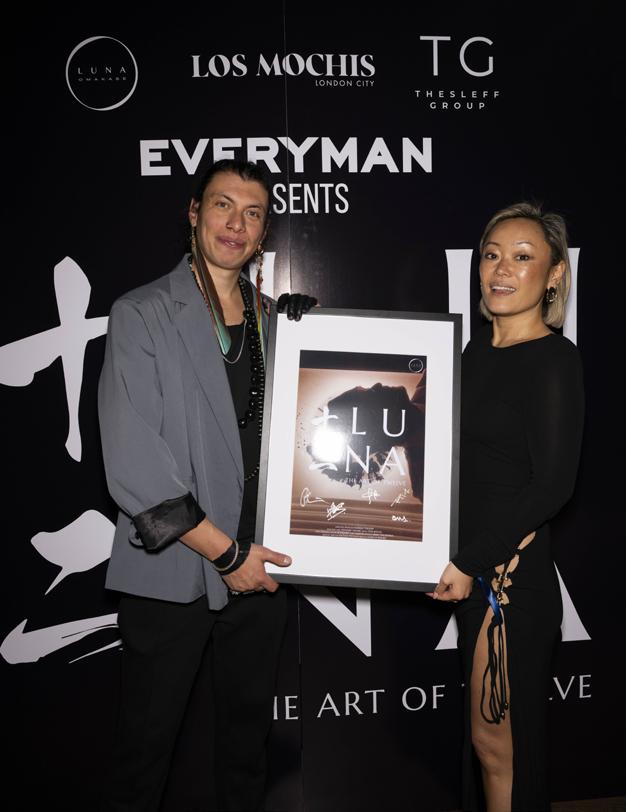
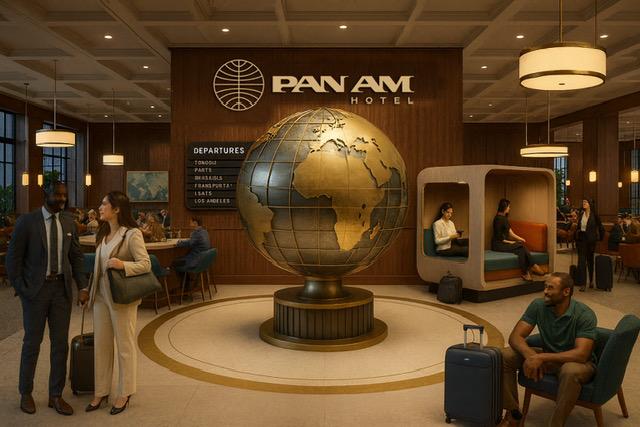
JP Hospitality has announced the international launch of its new premium-lifestyle hotel brand: PAN AM HOTEL.
Inspired by the golden age of travel, PAN AM HOTEL brings premium-lifestyle, iconic midcentury design, and a distinct brand identity to the airport hotel segment – creating a whole new category: airport hospitality that excites guests and appeals investors.
Guests can expect lifestyle-oriented amenities such as 24/7 access to food and beverages, sleeperettes for flexible stays, expansive wellness areas, state-of-the-art gyms, gaming lounges, and family zones with dedicated kids’ entertainment. Combined with a strong design DNA, PAN AM HOTEL redefines what airport hotels can and should be.
This launch marks a strategic milestone for JP Hospitality: for the first time, the company is stepping into the role of hotel operator –opening a new chapter in its evolution and expanding its footprint as part of the JP Real Estate Group.
The evolution of airports into standalone business parks and the constantly growing number of overnight stays make airport hotels a particularly resilient and high-growth asset class.
The first two PAN AM HOTEL locations will open at European airports in 2028.
By the end of 2033, the plan is to open 16 hotels in total – establishing PAN AM HOTEL as a leading presence in airport locations worldwide.
IHG Hotels & Resorts (IHG) announces the signing of Kimpton Salzburg, in partnership with tristar Austria GmbH. The hotel marks the luxury lifestyle brand’s entry into the Austrian market.
Expected to open in mid-2028, Kimpton Salzburg will further enhance IHG’s expanding portfolio of 12 open Kimpton hotels in Europe, and a further six in development.
Kimpton Salzburg will form part of a redevelopment project, led

by Midstad, with the 119-room hotel joining a number of high-end retail units and other shops. The hotel’s prominent location within this vibrant new destination will invite both guests and locals to experience the brand’s distinctive blend of sophistication and playful hospitality firsthand.
Situated on the historic banks of the Salzach River, the hotel will benefit from convenient access to key transport routes as well as close proximity to Salzburg’s vibrant cultural district - placing guests within easy reach of renowned landmarks, festivals, and local attractions.
Guests staying at the unique, design-forward hotel will enjoy a mix of guestrooms, including eleven suites with uninterrupted views of the river and castle.
Grand Metropolitan Hotels, one of the world’s leading hotel management companies, is taking over the management of the Sealeven Hotel in Opatija, Croatia. The opening is scheduled for spring 2026.
The exclusive aparthotel in Croatia, located along the picturesque Adriatic coastline, will operate under the wellestablished Destination by Hyatt brand. Completion and opening of the expansive hotel complex — comprised of several interconnected buildings — is planned for the second quarter of next year.
As part of this new development, Grand Metropolitan further expands
its position as an international white-label hotel operator.
As part of the Destination by Hyatt brand, the Sealeven Hotel becomes part of a global network of premium properties that guarantee the highest quality standards and offers travelers world-class service and comfort.
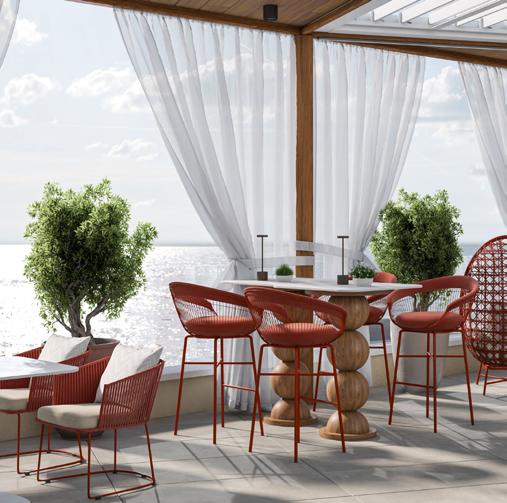
Unyoked, the pioneering Australian nature start-up behind the current global off-grid cabin trend, is partnering with Forestry England, the country’s largest land manager, to launch a groundbreaking new initiative that will see off-grid cabins roll out throughout Forestry England woodlands over 10 years, in an effort to help the public access nature and embed its scientifically-proven wellness benefits into their everyday lives.
Starting early 2026, the initiative will initially see five secluded, offgrid and minimal footprint cabins (accommodating 1-2 people) in the first location, with a further 25 cabins at five sites to follow in the year. The cabins will be positioned off the beaten track and away from other cabins, forest facilities, and infrastructure.
The experience will allow guests to fully immerse themselves in the forest landscape, offering a new and personal way for guests to enjoy the nation’s forests. This partnership will build on the global success of Unyoked to date, which has been centred around the joy and wellness benefits of taking time out from the everyday grind,

to take regular breaks in the wild, to reset and recharge.
Research has shown that time spent in nature can be as effective as established wellness interventions like meditation, yoga, and Cognitive Behavioural Therapy. A 2024 study by Unyoked and AllTrails, found that participants who spent time in Unyoked’s cabins experienced a reduction in feelings of burnout and increase in positive mental wellbeing of up to 50% higher than other more commonly used interventions like exercise, mindfulness, or art therapy.
Forestry England and Unyoked’s shared goal is to inspire a nationwide movement towards nature immersion. By opening nature experiences and making them more appealing, they hope to cultivate a deeper appreciation for England’s forests and foster a sense of stewardship that will help protect these vital ecosystems for generations to come. This partnership is an extension of Forestry England’s current activity, accommodation, and wellbeing offerings, which includes physical and adventure activities, overnight stays, wellbeing trails, and more.
Bookings for the first Unyoked cabins in Forestry England forests will open 2026.
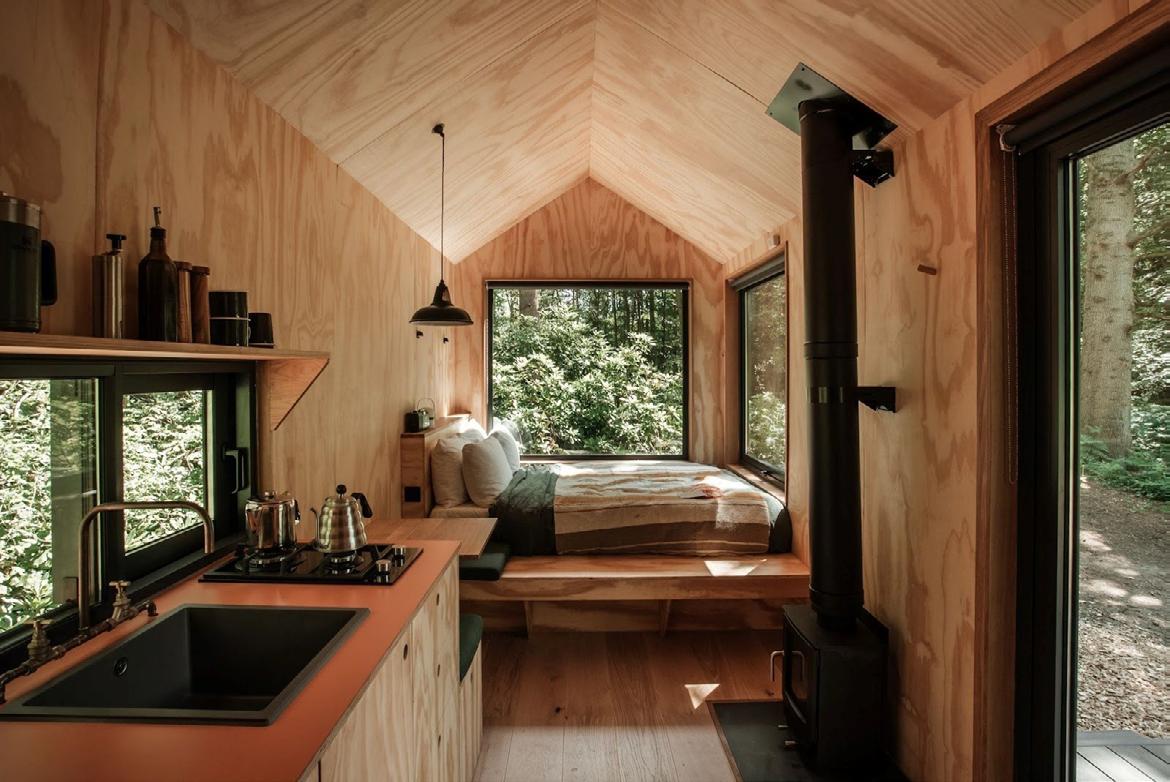

MGallery, Accor’s boutique collection of storied hotels, has announced the signing of Madarao Kogen Hotel and Lime Resort Myoko in Japan, both properties are part of a strategic partnership with Patience Capital Group.
Nestled within the heart of the Japan Alps at the northern most part of Nagano Prefecture, Mt. Madarao offers an exceptional retreat in every season. The existing property will undergo a comprehensive transformation, with its reopening anticipated in late 2027. The resort is planned to offer 80 guest rooms, ranging from standard rooms and deluxe rooms to suites designed to blend Alpine-style comfort with Japanese minimalism.
Located near the base of Mt. Myoko within the beautiful Myoko-Togakushi Renzan National Park, is Lime Resort Myoko – MGallery Collection. This existing property will be transformed into a modern wellness-focused resort and is expected to have 38 rooms and open by Winter 2026.
Renovations at both resorts will prioritize sustainability, integrating local materials and energy-efficient technologies while respecting the natural contours and heritage of the sites.
Signing ceremony in Singapore on October 23rd. From left to right: Maryanne Soo, Managing Director, General Counsel at Patience Capital Group; Ken Chan, Founder, CEO & CIO at Patience Capital Group; Agnès Roquefort, Global Chief Development Officer Luxury & Lifestyle at Accor; Carrie Oswald, Senior Legal Counsel in Asia at Accor

Card reader takings in your account the next day* means less ‘oh no’ and more ‘ooh la la’.
Because when you’re not worried about cash flow, and there aren’t any hidden fees, you can turn your attention to more pressing matters – like saving your apprentice from another fringe accident.
What’s good for small business is good for everyone.



From velvety browns to muted greens, we round up the tones, textures, and finishes that defined luxury interiors this year.
As the weather cools and the days grow shorter, this year’s palette invites a return to warmth, comfort, and quiet sophistication. Minimalist whites and icy greys are giving way to depth, texture, and the understated opulence of nature-inspired hues. Designers and homeowners alike are embracing colours that soothe and steady — velvety browns, soft greens, and earthy reds that evoke the calm of the outdoors, layering warmth and elegance into every corner of a home.
According to Bluefield Realty Group, these tones do more than elevate décor — they shape how buyers and visitors emotionally connect with a space. Homes styled in warm, natural hues photograph better, feel more inviting, and foster the intimacy that transforms interest into offers.
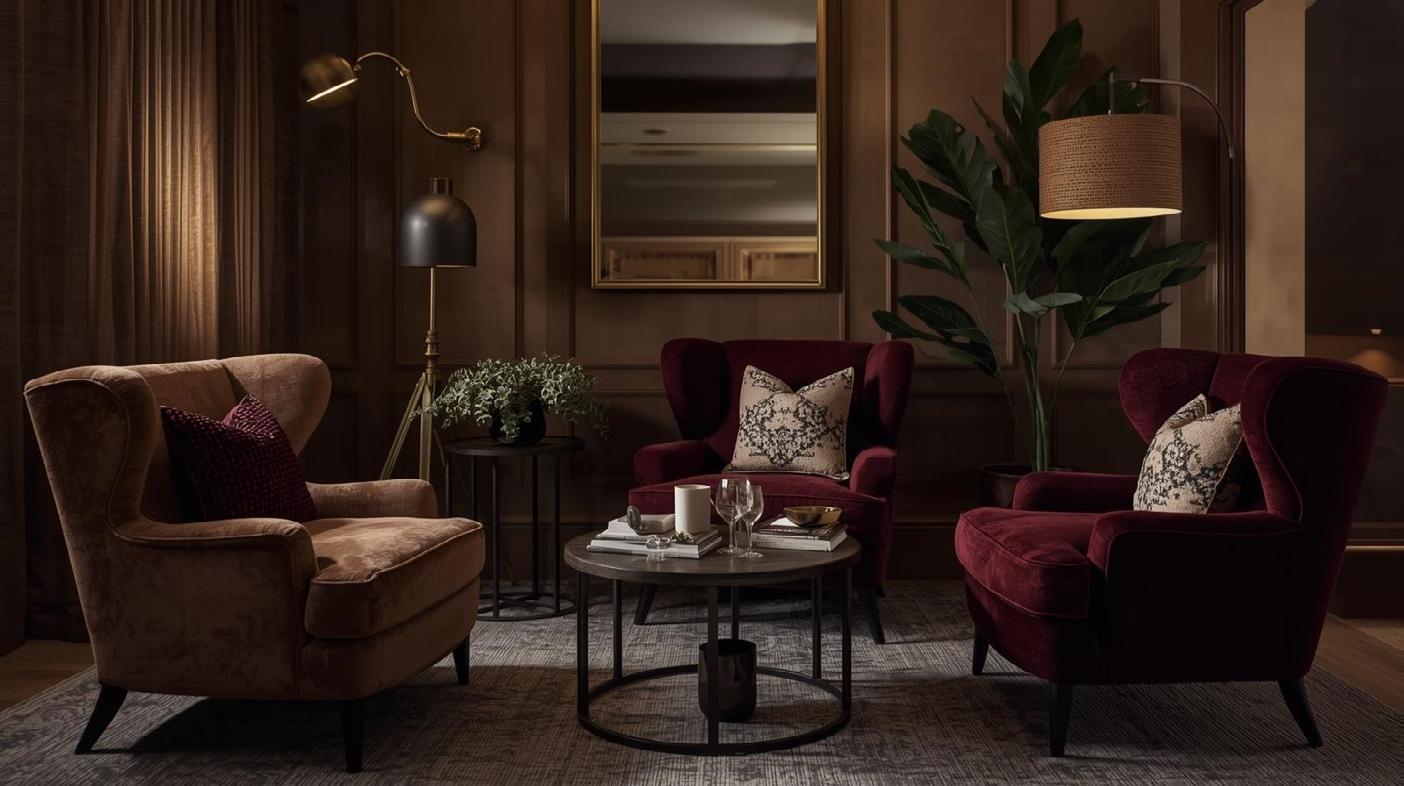
• Mocha Mousse: Pantone’s Colour of the Year, this velvety brown serves as the season’s anchor. Its chocolate undertones create warmth and depth, proving that brown’s resurgence is more than a passing trend.
• Rich Burgundy: A wine-toned shade seen across fashion runways and interior collections, adding quiet drama and a touch of old-world sophistication.
• Sage and Olive Green: Rooted in biophilic design, these muted greens bring serenity and balance, subtly connecting interiors to nature.
• Warm Taupe and Caramel: Replacing cooler greys, these golden neutrals offer softness and versatility, harmonising effortlessly with both light-filled and moody spaces.
• Burnished Gold Accents: Inspired by antique finishes and brushed metals, burnished gold provides a gentle, refined glow — understated yet unmistakably luxurious.
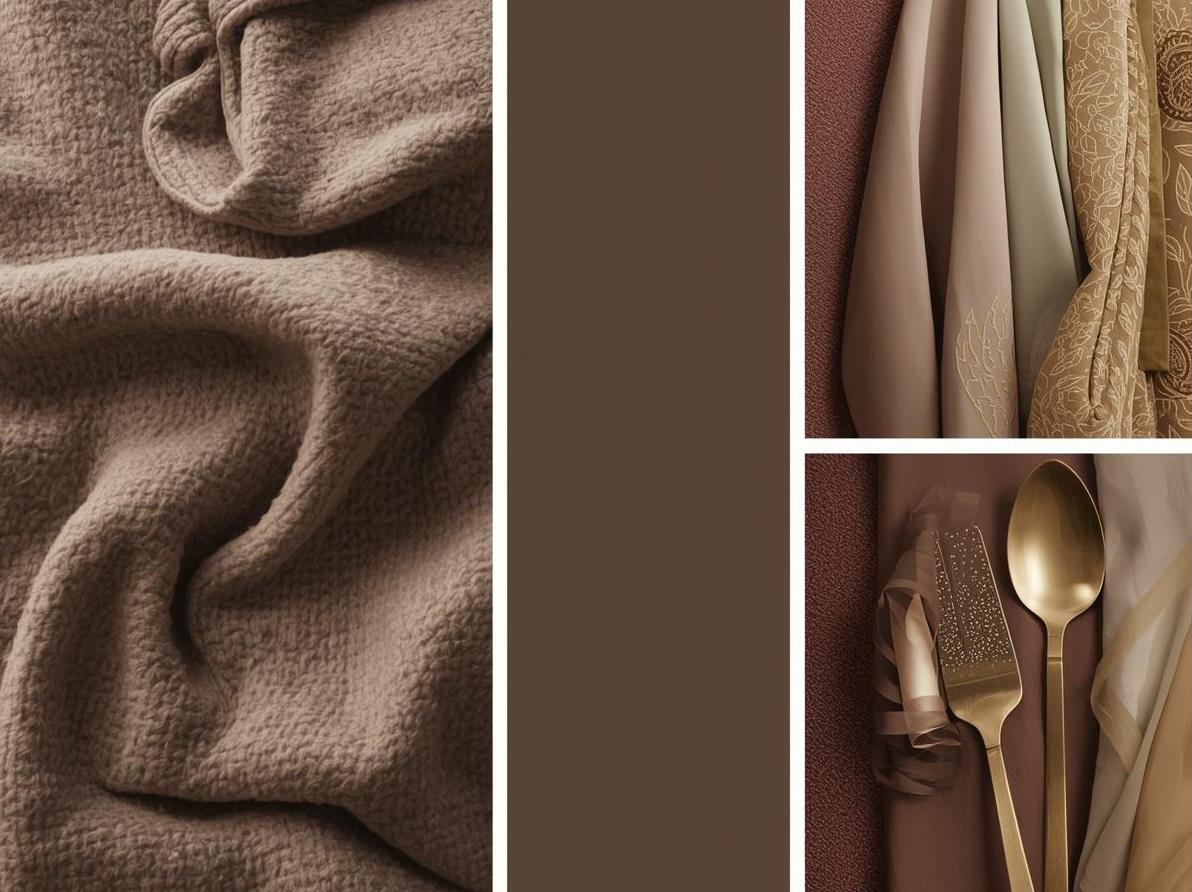
• Layer Neutrals: Base walls and larger furniture in Mocha Mousse or Warm Taupe to create a warm, inviting canvas that interacts beautifully with natural light.
• Introduce Depth: Accent walls, upholstery, or artwork in Rich Burgundy bring richness without overwhelming the space.
• Bring Nature Inside: Incorporate Sage or Olive Green through cabinetry, soft furnishings, or plants to enhance calm and continuity.
• Highlight with Gold: Use burnished gold sparingly — on handles, mirrors, or lighting — to add refinement without ostentation.
• Balance Texture and Tone: Combine these shades with tactile materials such as linen, timber, or brass to achieve layered, dimensional interiors that feel both curated and lived-in.
“This autumn and winter, interiors are embracing nature’s most comforting tones,” says Michael Smith, Real Estate Expert at Bluefield Realty Group. “The palette moves away from stark contrasts toward rich, layered harmony, drawing inspiration from Pantone, Dulux, and design week forecasts. These shades bring a sense of balance and calm that feels especially relevant in today’s homes.”
Whether refreshing a private residence or styling a property for sale, these colours cultivate warmth, cohesion, and sophistication. With velvety browns, muted greens, and subtle metallic touches, the palette grounds interiors in elegance and timeless comfort, creating spaces that are both inviting and unforgettable.


Samantha Drummond has her finger on the pulse when it comes to extraordinary hospitality design. From Australia to Asia and Northern Europe, the Founder of Habitus Design Group has spent the past 25 years creating seminal resorts, working with demanding clients looking for one-of-a-kind, commercially successful solutions. Little wonder then that she has recently turned her creative focus onto supper clubs, which are enjoying something of a renaissance since the pandemic.
The very name suggests exclusivity. Unlike Samantha’s projects, they do not necessarily involve fantastical design,

but they always deliver an immersive experience with a sense of an after-dark secret.
Drummond says: “For me, supper clubs are places where designers’ creativity can let rip with the purpose of creating something that’s unforgettable and, because you want guests to come back time and again, the more that you have for them to discover, the more they are likely to become loyal.”
Samantha has recently designed a supper club for Copenhagen, challenged to imagine a destination that was utterly different from the city’s many high-end restaurants. Her response combined a celebration of the existing, grandly vaulted interior architecture with sheers that cascade from the ceiling, flirting with the illumination. Extravagantly upholstered furnishings and rich colours are combined with scents wafting through the rooms and lighting that transforms the atmosphere to a nightclub vibe late in the evenings. Dozens of decorative dragonflies embellish the walls. The club is both imposing and playful, a journey for all senses.
Over 6,000 miles away, Samantha is putting her finishing touches to another supper club. Named Quezon Club due to

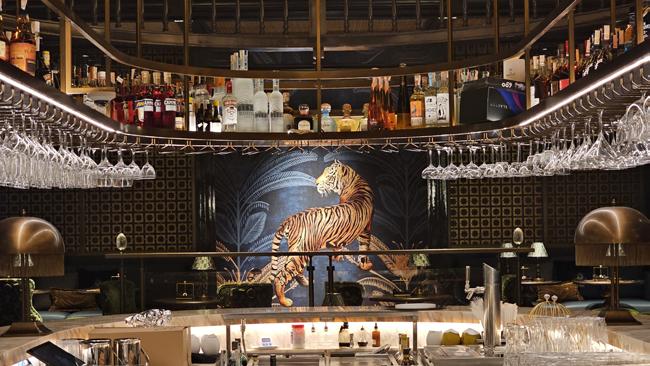
its location in Manila’s Quezon City, it is the late-night dining and entertainment destination at Solaire North, the Philippines’ first five-star integrated resort. Habitus designed the entire resort starting with Samantha’s concept of an urban oasis. It’s a vision referenced across the property that reaches its theatrical zenith in the club. Here, magnificent tigers prowl the extravagant flora of a mythical jungle, leopards put in an appearance and the horns of the Carabao water buffalo, so integral to local culture, adorn the rooms. Mother of Pearl ceilings shimmer in the illumination, balancing the rich velvet fabrics of the furnishings and the specially designed flock wall coverings, while numerous objects drawing on the jungle theme create intriguing collections on side tables to further heighten the senses of the participants.
Quezon Club is a fantasy, curated to make guests feel uplifted and exclusively invited into a mythical paradise. It is also important that they feel “at home”. To that end, there are numerous comfortable armchairs to sink into and the quality of craftmanship is second to none, from hand-stitched leather upholstery to many examples of exquisite wood turning and other finely detailed features.
For more information visit: www.habitusdesigngroup.com

It's about empowering hoteliers to deliver the premium coffee experience their guests truly desire, seamlessly integrating quality coffee into every aspect of the guest journey, while simplifying operational intricacies.
In September, L’OR unveiled its new bean-to-cup barista style coffee offering, specifically designed to deliver a premium coffee experience across core high footfall touchpoints during busy breakfast hours. Available in both elegant counter and convenient self-serve formats, the package offers a complete branded coffee experience, featuring a wide café-style menu using L'OR high quality responsibly sourced coffee beans, elegant accessories, and sophisticated point-of-sale materials to elevate every moment.
The L'OR solution is available in two distinct options, tailored to a multitude of consumption occasions and operational needs:
• L’OR Barista Style Countertop Coffee Solution - Ideal for cafés, bars, and restaurants, the solution empowers staff to craft a wide array of L'OR hot beverages to elevate any coffee moment with consistency, delivering a served coffee that exudes quality.
• L’OR Barista Style Self-Serve Coffee Solution - Addressing the demand from 61% of hotel guests who consider a 24/7 self-serve coffee machine important*, this premium self-serve solution, complete with a dedicated L’OR furniture unit, is perfect for hightraffic, convenient locations such as hotel breakfast buffets, receptions, lobbies, and executive lounges. It provides guests with 24/7 access to barista-style coffee, catering to those on-the-go and extending the coffee experience beyond traditional service times which can unlock new potential revenue streams for hotels by capturing occasions from guests checking out early or waiting to check in.
At JDE Peet's, we understand the intricate dynamics of the hospitality sector – where every detail contributes to a memorable guest journey, and coffee is far more than just a beverage. That’s why our L'OR Professional package offers a complete and considered coffee
experience, with all the accessories and little details included that elevate every moment. It's about empowering hoteliers to deliver the premium coffee experience their guests truly desire, seamlessly integrating quality coffee into every aspect of the guest journey, while simplifying operational intricacies.
Full package details below:
L’OR premium, barista style self-serve coffee solution - A fully automatic beanto-cup machine offers a premium, selfserve solution bringing barista-quality coffee on-the-go to areas such as hotel lobbies, where premium quality and high capacity are essential.
• Offers user friendly, café-style, baristaquality wide menu variety under the L’OR brand at the touch of a button.
• Hassle free 24/7 self-serve solution, Ideal for hotel reception area
• Premium and stylish furniture appearance including a user-friendly Schaerer Soul coffee machine with a 12-inch L'OR branded interface to enhance the guest experience.
• Includes L'OR high quality responsibly sourced beans, L'OR branded point of sale and accessories
• Payment system available at the unit
• Ingredients, installation, servicing, maintenance and training included*
• No upfront investment and competitive commercial arrangement
* Based on commercial model agreed
L'OR premium, barista style counter service coffee solution – A full experience, for the ultimate coffee pleasure.
• Offers user friendly café-style, baristaquality wide menu variety under the L’OR brand at the touch of a button.
• Ideal for cafes, bars or breakfast countertop service
• User-friendly Schaerer Soul coffee machine with a 12-inch L'OR branded interface to enhance the guest experience.
• L'or 1kg premium, responsibly sourced beans
• Includes L’OR branded point of sale and accessories
• Ingredients, installation, servicing, maintenance and training included*
• No upfront investment and competitive commercial arrangement
* Based on commercial model agreed
The power of brand and trust
60% of guests are more likely to buy coffee if it’s a known brand, especially

Gen Z who are 77% more likely to be swayed*
• A recognisable coffee brand builds confidence. Guests are more likely to buy coffee if it’s a known brand.
• 72% of UK consumers consider coffee quality important*
• 77% associate recognised brands with quality*
Today’s consumers demand café-quality. With coffee drinkers considering quality important, offering diverse, high-quality beverages is no longer optional. This is further reinforced by the fact that a significant proportion of consumers associate recognised brands with quality, highlighting the importance of both inherent quality and the perceived assurance that a known brand can offer.
The growing importance of sustainability
• 14% actively seek responsibly sourced coffee*
Conscious consumers value responsible practices and a commitment to sustainability.
The JDE Peet’s Common Grounds programme embodies our ambition to positively impact people, our planet, and the future of coffee and tea. Common Grounds is comprised of three pillars: Responsible Sourcing, Minimising Footprint and Connecting People. Bringing all our ongoing sustainability work together under one programme.
The rise of convenience and 24/7 access
• 64% of guests drink coffee in the morning*
• 61% consider a 24/7 self-serve machine important*
• 11% of guests drink coffee in the evening*
Our research shows the demand for accessible, high-quality coffee beyond traditional service hours. While the morning remains the dominant time for coffee consumption during a hotel stay, a notable percentage of guests also enjoy coffee in the evening, lunch time, and afternoon. This diverse consumption pattern further underscores the need for convenient, round-the-clock coffee options to cater to guests’ varied routines and preferences.
The need for smooth service
• 26% of guests prioritise good customer service and speed for their hotel coffee*
Long queues frustrate guests and disrupt operations, ensuring efficient service within high throughput occasions is important.
Hannah Morris, Head of Out of Home at JDE Peet’s UK&I, shares some key tips for operators looking to make the most out of their coffee offering:
• Ensure smooth service and guest flow in high footfall areas – “With 26% of guests prioritising good customer service and speed when enjoying coffee during their hotel stay*, it is important to consider the right coffee solution.
Continued >>>
Today’s consumers demand caféquality. With coffee drinkers considering quality important, offering diverse, high-quality beverages is no longer optional. “ “
• Operators need to serve drinks quickly and efficiently, ensuring a seamless experience that keeps guests moving, happy, and ready to fully enjoy their visit. In high-footfall areas like bustling breakfast rooms and conference breakout areas, pace of service is key.”
From the bustling breakfast buffet to the serene lobby lounge, and even in-room dining, they anticipate a diverse café-quality menu – lattes, cappuccinos, flat whites, and even hot chocolates – all delivered with consistent excellence.
• Offer a diverse range – “Today’s hotel guest expects more than just a standard cup of coffee. From the bustling breakfast buffet to the serene lobby lounge, and even in-room dining, they anticipate a diverse café-quality menu – lattes, cappuccinos, flat whites, and even hot chocolates – all delivered with consistent excellence. Hotel operators need to meet this demand not just with variety, but with the capacity to handle high volumes during peak periods without compromising quality or service. Whether an early-morning commuter or a leisurely holidaymaker, it is important to offer guests their preferred beverage, consistently prepared, every time.”
• Keep it simple – “Today’s hotel guest expects more than just a standard cup of coffee. From the bustling breakfast buffet to the serene lobby lounge, and even in-room dining, they anticipate a diverse café-quality menu – lattes, cappuccinos, flat whites, and even hot chocolates – all delivered with consistent excellence. Hotel operators need to meet this demand not just with variety, but with the capacity to handle high volumes during peak periods without compromising quality or service. Whether an early-morning commuter or a leisurely holidaymaker, it is important to offer guests their preferred beverage, consistently prepared, every time.”

*This research of 2,000 UK-based adults in the UK who have stayed in a hotel in the past 12 months commissioned by L’OR and conducted by Mortar Research in July 2025.
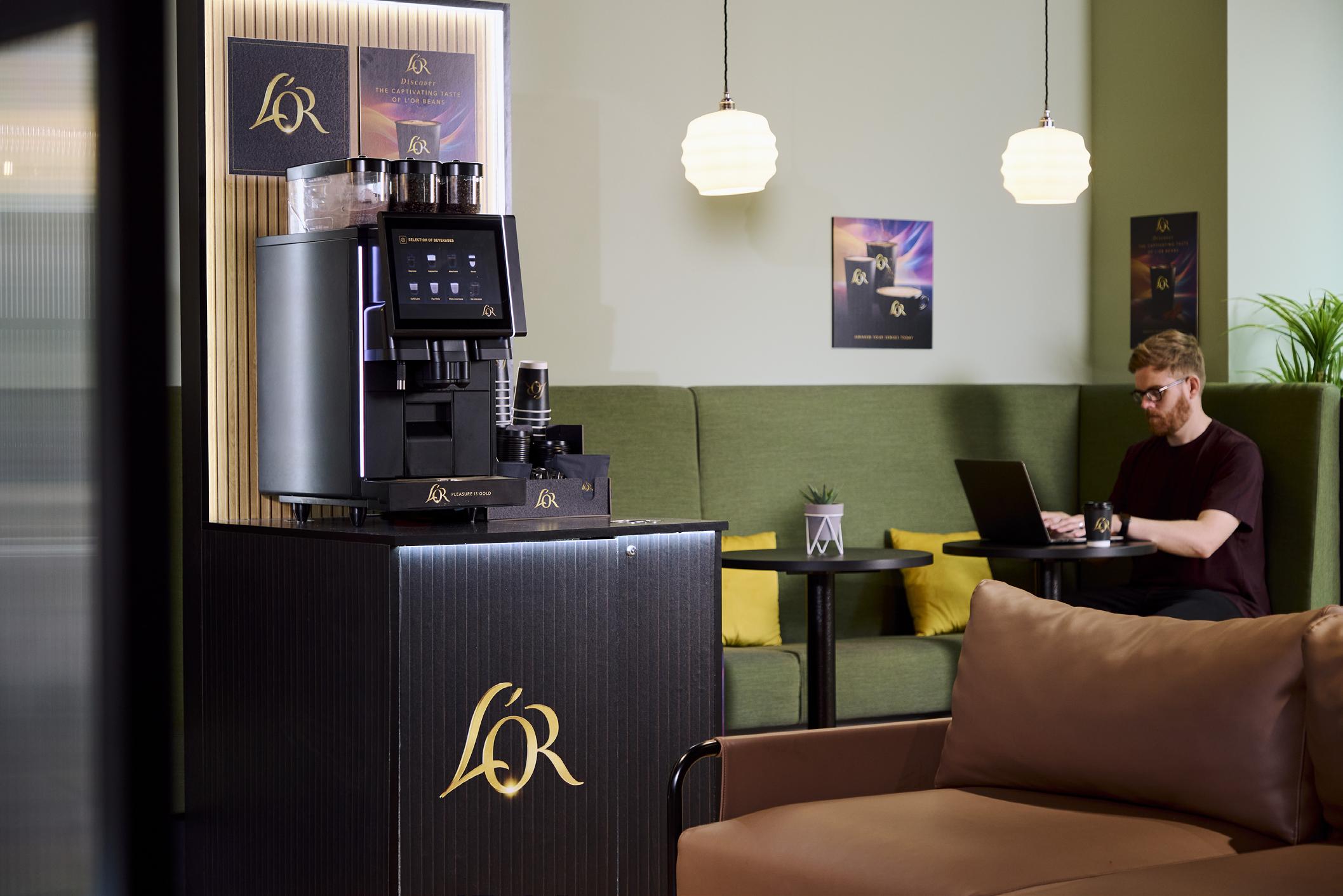



THE L’OR BEAN-TO-CUP
Barista-Style Coffee Offering INCLUDES Machine, Beans, Accessories Installation & Servicing * AND Competitive Commercial Arrangement
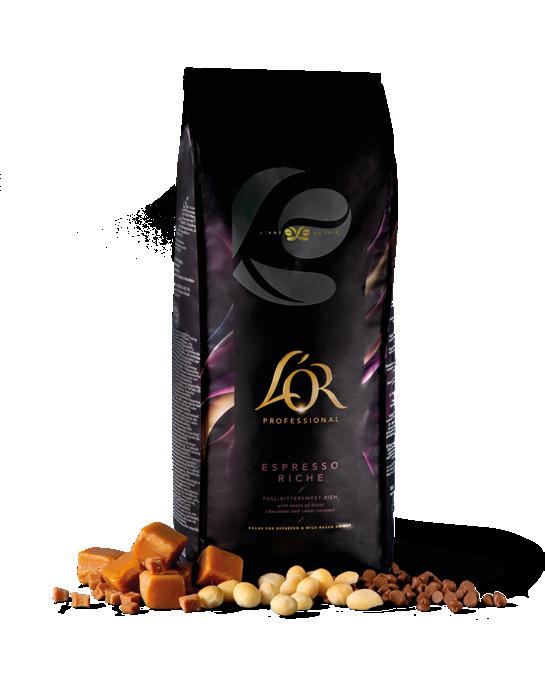
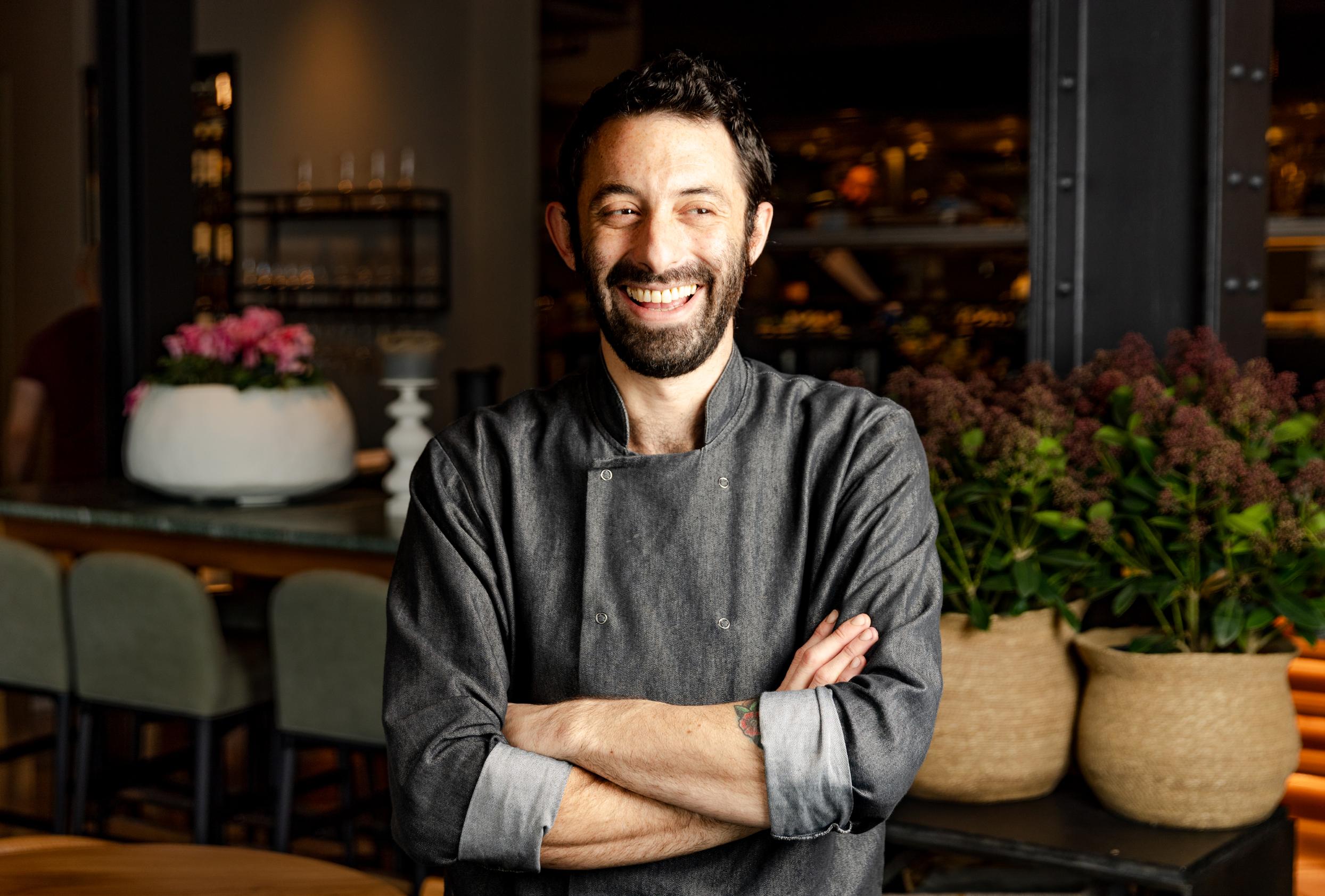
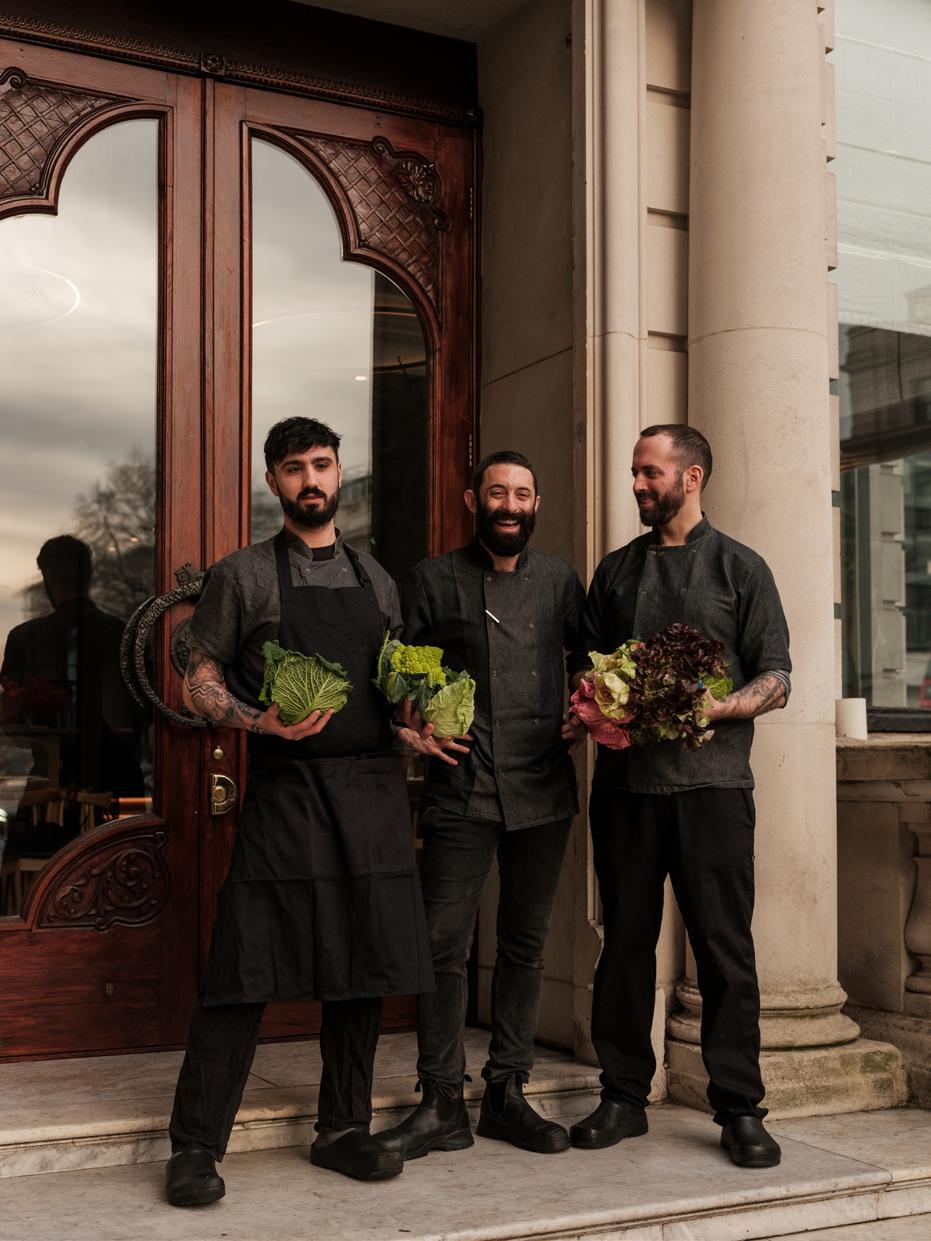
Few new openings have captured London’s attention quite like Claro. Within just a year of launching in St James’s, this modern Mediterranean restaurant has been recognised by the Michelin Guide, praised for its ingredient-led cooking, elegant design, and assured service.
Stepping in from the rush of Waterloo Place, the change in atmosphere is instant. The space feels effortlessly serene — high ceilings, amber lighting, and soft textures creating an openness that’s both grand and welcoming. There’s no self-conscious design statement here; instead, a gentle sophistication that lets the food and conversation take the spotlight. The open kitchen catches your eye subtly with movement, precision, and ease — a kind of quiet theatre that you watch without realising.
Guiding the kitchen is
whose Tel
inform a balances and generous cuisine rooted in the seasons. Working alongside Chef Patron Ran Shmueli, who founded the original Claro in Tel Aviv in 2014, Issawy brings an Eastern Mediterranean sensibility that translates beautifully to London.
We began with the yellowtail crudo — thin slices dressed with freekeh tabbouleh, pistachio, yoghurt, and tomato salsa.
“
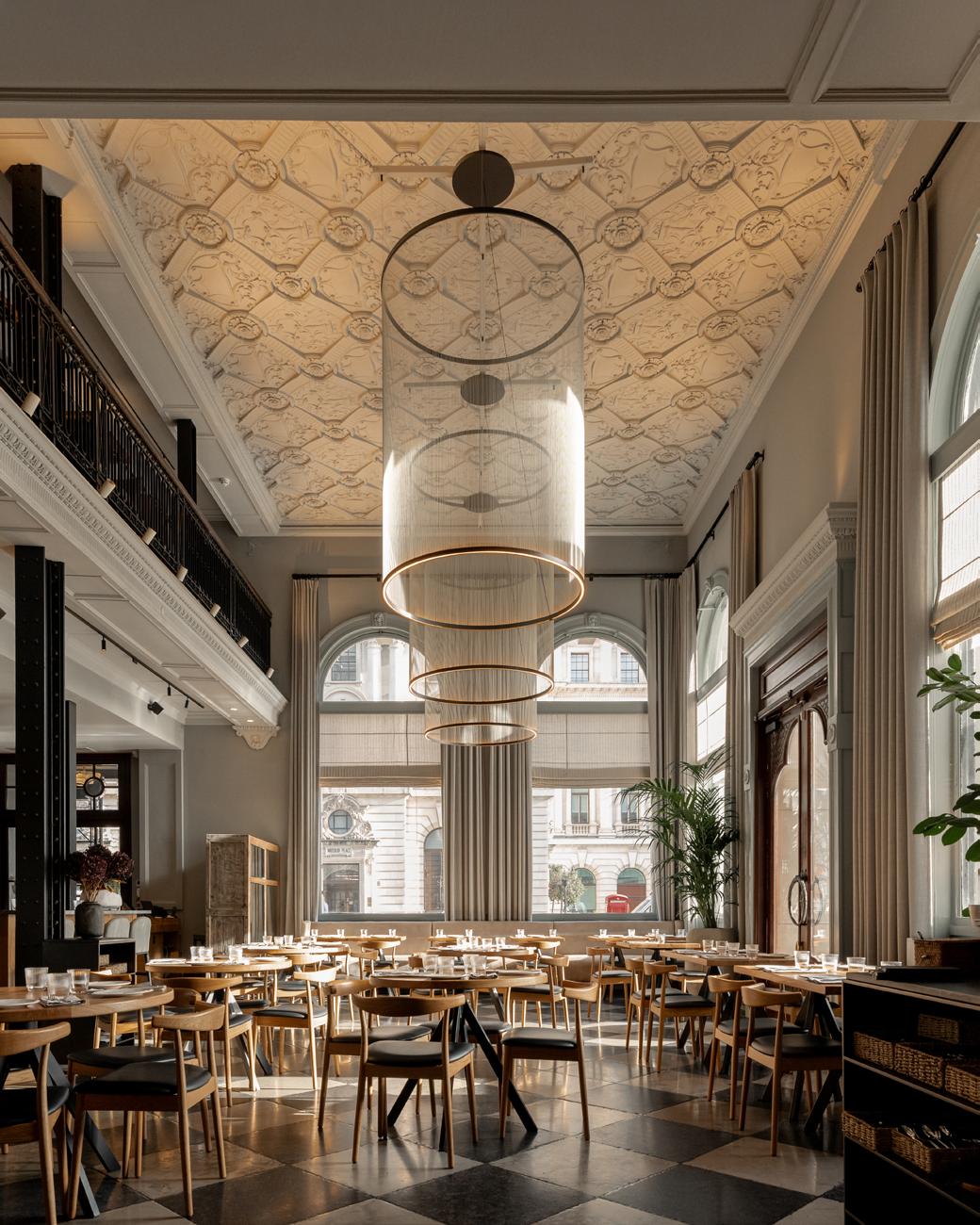
Their partnership has given rise to something entirely its own — a graceful conversation between heritage and modernity, defined by confidence. Our visit coincided with Claro’s firstanniversary Berkshire menu, a monthlong celebration of local producers — a way to honour the restaurant’s first year through the language of British ingredients, expressed with Mediterranean brightness.
We began with the yellowtail crudo — thin slices dressed with freekeh tabbouleh, pistachio, yoghurt, and tomato salsa. Light, fresh, and finely tuned, it set the tone for the clarity of flavour to come. The roasted beetroot, paired with smoked labneh, Wigmore cheese from Riseley, and shards of crispy kale, was just as poised. The sweet, earthy beetroot played against the labneh’s subtle smoke, each element harmoniously distinct.
The venison tartare from Vicars Game — another Berkshire highlight — followed and proved the standout dish of the evening. Finely cut with a clean, pure flavour, it came with a potato pavé “cacio e pepe” so beautifully constructed it felt like a small act of devotion. Golden, crisp, and delicately layered, it transformed a side into something unforgettable. Together, they captured what Claro does best — precision, restraint, and a respect for ingredients.
For our main course, we shared the Claro Lamb Platter, slow-cooked for fifteen

hours until tender enough to fall apart under the fork. Served with tzatziki, matbucha, and pickled vegetables, it balanced smoke, acidity, and spice with striking composure. It’s the kind of dish that feels celebratory and generous, guided by care rather than excess.
To drink, the Unterebner Pinot Grigio 2022 from Alto Adige was an inspired

match. When we asked for a pairing, our waiter called over Head Sommelier Ron Bronfman, who offered two wines to taste before we decided. He approached the pairing with thoughtful guidance, and the crisp Italian white became the perfect thread through the evening. That interaction alone summed up the spirit of Claro’s service — knowledgeable, gracious, and genuinely attentive.
It’s rare to find hospitality this seamless. The team works with quiet precision; every pour, every plate, every pause between courses feels naturally timed.



Nothing is overstated, yet nothing is overlooked. It’s attentiveness that comes from genuine pride rather than performance, allowing guests to relax into an easy rhythm.
During the evening, Chef Patron Ran Shmueli came out from the kitchen — a gracious gesture that spoke volumes. Warmly, he asked about our experience and shared reflections on the restaurant’s first year in London. It was a sincere moment that encapsulated the sense of connection Claro is built on.
Dessert carried the same discreet confidence. The Bread Pudding — made
After just a year in its London hub, Claro feels entirely assured, building something lasting. Its Michelin Guide recognition is less like an accolade and more an affirmation of its beautiful integrity. “ “
from challah cubes soaked in crème anglaise with cinnamon-caramelised apples and clotted-cream ice cream — was comfort reimagined, a familiar pleasure elevated with light, rich nuance. The Pecan Pie, a New York-style classic with a nut-rich, gooey centre on a fine pastry base, had been recommended by our exceptional waitress and lived up to every expectation. Its buttery depth, touched with sea salt, was the perfect finish — indulgent without tipping into sweetness. Her thoughtful recommendation captured the warmth that defines the team: a genuine wish to share what they love.
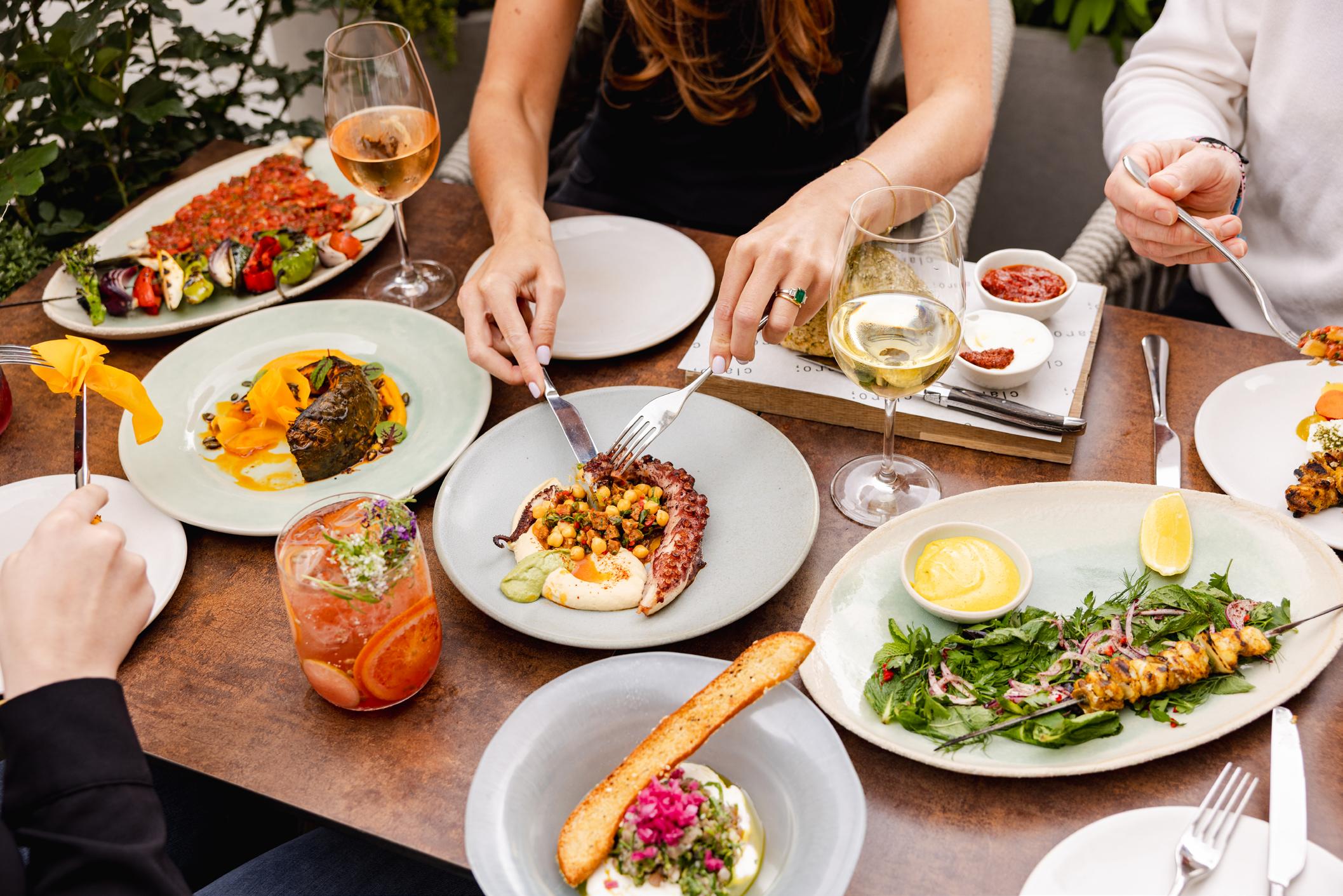

What truly distinguished our Claro experience was the people behind it. From the chefs at the pass to the servers front of house, everyone moves with the same ease and passion. The atmosphere they’ve created is rare — polished and professional, yet deeply genuine. The sense of welcome here comes not only from formality, but also from thoughtfulness — a keen awareness of what makes guests feel seen and at ease.
After just a year in its London hub, Claro feels entirely assured, building something lasting. Its Michelin Guide recognition is less like an accolade and more an affirmation of its beautiful integrity. Every element — from the pacing of the meal to the precision on the plate — demonstrates an understanding that great dining goes beyond spectacle, favoring carefully curated substance over show.
This winter, the restaurant continues its story with Christmas at Claro, offering East Mediterranean–inspired set menus for groups and private gatherings. It’s a fitting way to close the year, celebrating the generosity, connection, and thoughtful hospitality that define this place.


London has no shortage of exceptional restaurants, but few combine refinement and warmth quite like Claro. It’s a restaurant that lingers in memory because it knows exactly who it is. In a city that never slows down, Claro offers a rare kind of calm — a reminder that excellence can be quiet, graceful, and deeply human.
Sophie Weir
SENIOR EDITORIAL ASSISTANT
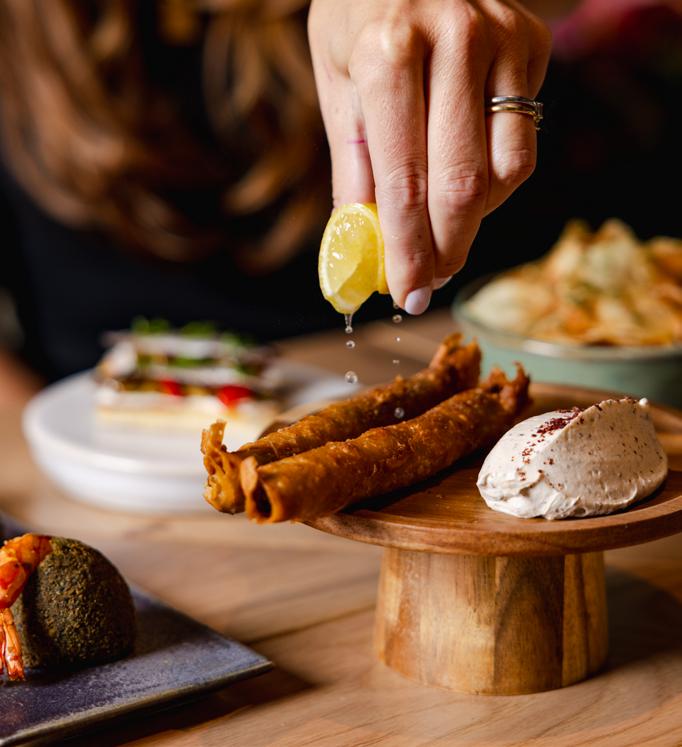






Korean cuisine is on the rise in London, celebrated for its bold flavours, communal dining, and playful balance of tradition and innovation. The team behind 3KOBROS brings this energy to Covent Garden with SOOM, a refined take on Korean BBQ designed to be both social and serene.
At SOOM, guests gather around the table to cook and share premium meats and seasonal vegetables. Each sizzle from the grill releases smoky, mouthwatering aromas, while marinated cuts, tender slices, and vibrant vegetables create a feast of textures and flavours. Beyond the grill, the menu offers a mix of classic and contemporary dishes — from spicy stews to delicate pancakes
— with options for vegetarian, vegan, and halal diets. Desserts are concise but playful, bridging tradition with modern favourites, while the drinks list features soju, Korean-inspired cocktails, carefully brewed teas, and refreshing nonalcoholic choices.
The experience extends to the interiors. Each stone table conceals an electric BBQ grill, letting guests cook and dine seamlessly in an elegant setting. The centrepiece is a twelve-seat circular table, topped by a sculptural ceiling inspired by traditional Hanok architecture. Nearby, the bar glows with handcrafted touches: Goryeo celadon vases, a hanji-wrapped counter, and a mother-of-pearl artwork depicting a serene Korean landscape.

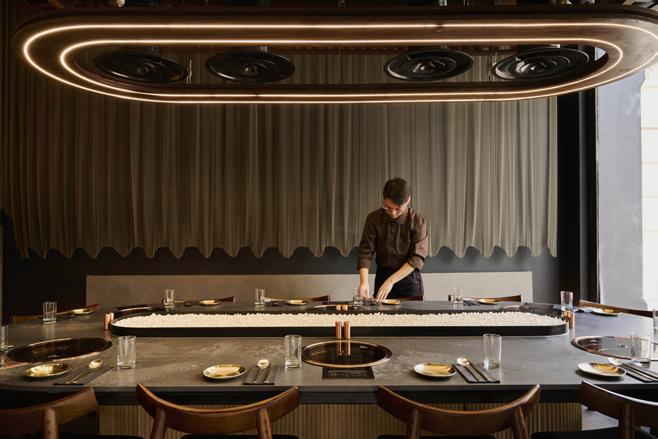
Further back, a two-metre-wide Jing ceremonial gong, traditionally struck to celebrate joyful gatherings, echoes the communal spirit of the restaurant, while a subtle “Circle of Light” reinforces the rhythm of shared dining. Sculpted arches and flowing curves create intimate nooks, while a private U-shaped dining room downstairs, framed by ink-wash panels and a mother-of-pearl folding screen, offers warmth and discretion.
SOOM encourages guests to linger, laugh, and toast to shared moments. Here, food, design, and culture converge in a dining experience that is as visually captivating as it is delicious. Now open at 99 St Martin’s Lane, it invites Londoners to taste, share, and savour Korean cuisine at its most refined.
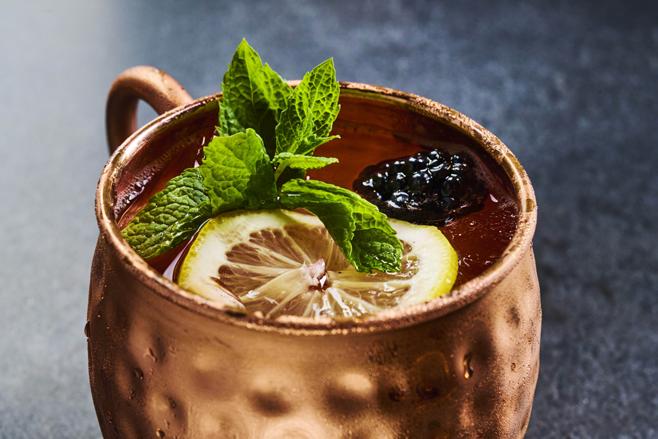








Chez Antoinette reopened its doors on Monday 10th November.
An eleven-year love story has returned to Covent Garden as Chez Antoinette, the cherished family-run French restaurant co-owned by husband-andwife duo Aurélia and Jean-Baptiste Noël-Delclos reopened on Monday 10th November following an elegant redesign and extension.
First opened by Aurélia in 2014, Chez Antoinette Covent Garden quickly became a local favourite for its warmth, generosity, and unmistakable French spirit. Eleven years on, the couple unveil a reimagined space that captures the essence of art de vivre — blending the soul of a Lyonnais café with the refinement of a Parisian townhouse.
Soft fabrics, brass accents, and antique mirrors set the tone for intimate gatherings, while a new open kitchen and pâtisserie counter bring the theatre of French dining to life.
Reopening with a renewed focus on heartfelt, traditional French cooking, Chez Antoinette introduces a new bistrostyle evening menu featuring French
classics such as boeuf bourguignon, onion soup, escargots, foie gras, and terrine, all inspired by Aurélia’s grandmother Antoinette and her authentic home-style recipes. Every dish reflects Aurélia’s deep passion for French cuisine and the emotional connection she brings to her craft.
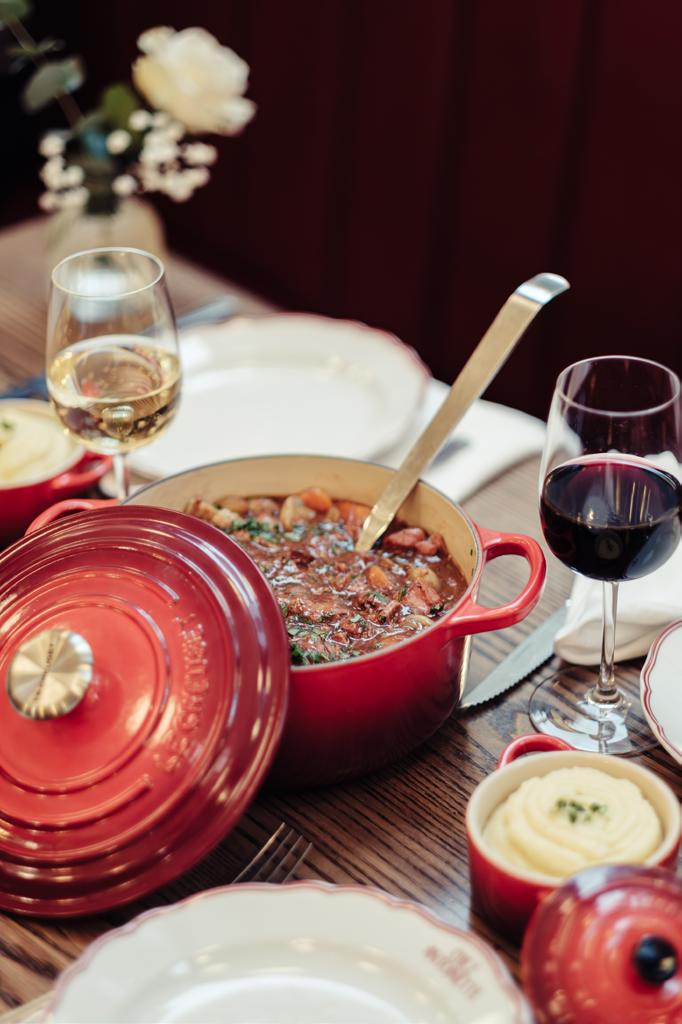
Having poured years of care into both the design and atmosphere of Chez Antoinette, Aurélia has created a space where guests don’t just dine, they feel something.
The result is a warm, inviting experience that’s as personal as it is delicious.
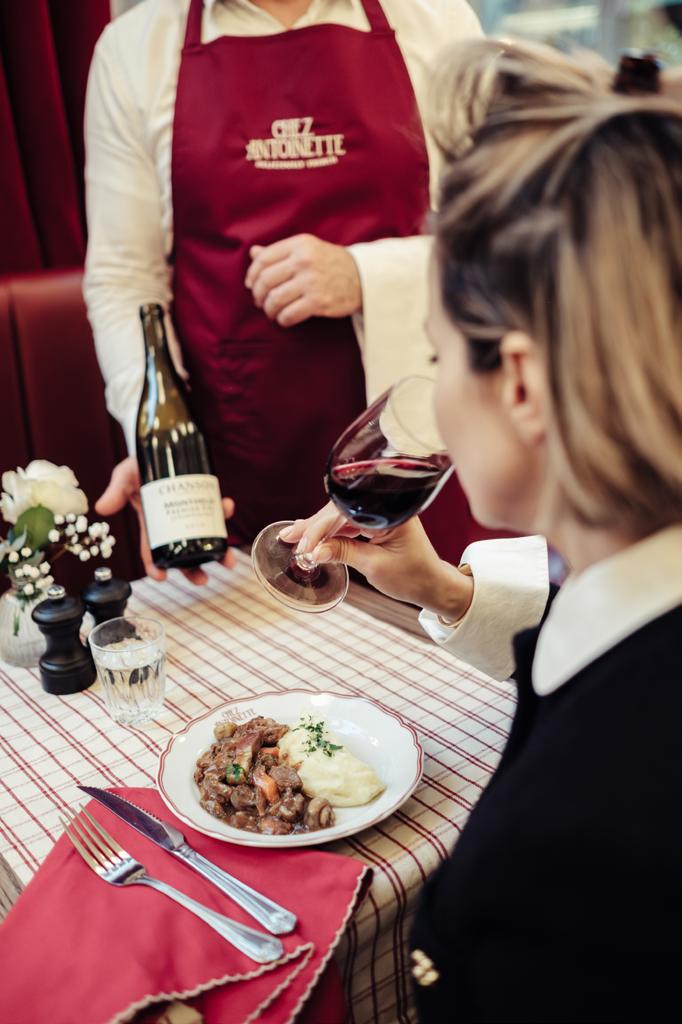
With very few places to stay in this part of the county, The Candover will continue its long legacy as a coaching inn for those who live nearby, and for visitors looking to explore this overlooked corner of Hampshire.
Think timber and stone floors, limewashed walls, antique furnishings, and a cosy bar with log fires – the kind of place you wander back to after a walk and feel instantly at home.
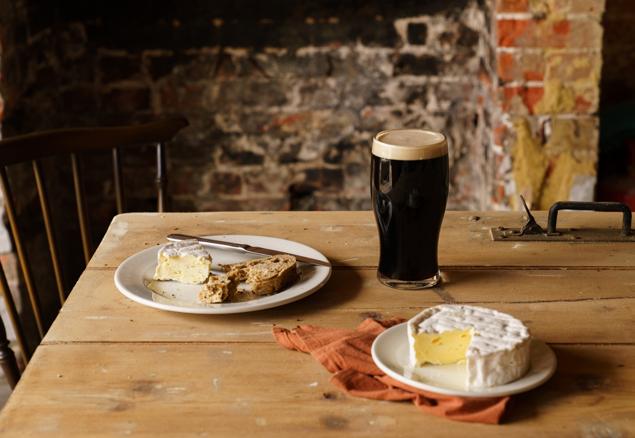
The Candover combines the warmth of a traditional village pub with contemporary hospitality, whilst staying true to the essentials - perfectly kept beer, great wine, and excellent food.
The Candover offers 10 bedrooms
- there are three Garden Rooms, featuring four-poster beds, Juliet balconies, and generous interiors. Two Family Rooms include built-in bunks for children and private patios leading into the garden. Two Large Rooms with Bathtubs offer super king-size beds and deep tubs for long soaks. Two Cosy Rooms provide snug, characterful spaces, while one Comfy Room offers a standard, well-sized bedroom with garden views.
The pub’s menus celebrate honest British food cooked over the coal and wood open grill. The Dining Room is a 50-cover space with linen-dressed
tables, bookable for breakfast, lunch, and dinner. The Pub, with another 50 seats, is walk-in only and serves pub classics, bar snacks, and the à la carte menu. Drinks reflect the best of the region and beyond: Candover Best, brewed exclusively with Triple fff Brewery; a curated wine “black book” of rarities; and cider from local maker Hydes.
Staying at The Candover puts Hampshire’s highlights within easy reach: explore Alresford’s watercress heritage, Stockbridge’s art scene, the medieval charm of Romsey, and the hamlets of the Candover Valley. Walk the South Downs, and enjoy culture at Winchester Cathedral, Jane Austen’s House, and The Grange Festival.
The Candover is not only a rare place to stay in this part of Hampshire but also the perfect base for exploring a county that blends charm, creativity, and countryside character.

A bold new three-storey Turkish destination redefining fire-led dining and hospitality in the heart of Mayfair.
This December, Mayfair welcomes Chargal, a bold new three-storey dining destination at 11 Berkeley Street, created and developed by Serdar Demir. A restaurateur known for redefining modern Turkish cuisine, Demir is also the founder of The Mantl, a renowned Turkish fine dining restaurant located in Knightsbridge.
Demir brings a unique blend of precision and creativity to his ventures and has been behind numerous successful London-based

food concepts most notably The Mantl in Knightsbridge, which has recently made waves on the international food scene in Türkiye.
With Chargal, he continues to push culinary boundaries, blending Turkish heritage with refined Mediterranean flair to transform London’s perception of modern Turkish dining. Here, mezze, dining, and vibrant nightlife come together under one roof.
At the heart of Chargal’s concept lies open-fire cooking, with the kitchen’s oak-charcoal flames fuelling both the menu and the experience. The menu introduces refined interpretations of Turkish classics, including the signature Wagyu Iskender — an indulgent reimagining of a national favourite crafted with premium wagyu beef for exceptional depth and richness. Other highlights include Grilled Halloumi Doughnuts, a playful, flame-kissed mezze innovations, and Kuru Cacık, a modern, textural interpretation of the traditional yoghurt-cucumber dish that celebrates purity and flavour.
Set to open in early December 2025, Chargal is already being hailed as Mayfair’s hottest new opening, promising to deliver a one-of-a-kind dining and nightlife destination that will redefine how London experiences Turkish cuisine.
Opening in January 2026 on 30 Upper Grosvenor Street, MA/NA is born from the Japanese philosophy that every ingredient carries an invisible power; a life-force shaped by nature and the hands that honour it. ‘Mana’ is defined as the spiritual energy that exists beneath the surface of all things and in all ingredients. It is felt rather than seen, it is what transforms emotion into experience, and a meal into memory.
Guided by this belief, the 156-cover restaurant and bar will serve refined Japanese dishes alongside an exceptional cocktail, wine and sake list. The restaurant and bar take equal billing - cocktails flow effortlessly into dinner, and dinner naturally returns to drinks.
MA/NA celebrates the craft of Japanese cuisine. The quiet mastery of precise cuts, the patience of fermentation, and the connection between earth and ocean. Every detail is intentional. Each dish captures a moment in its purest form, revealing the extraordinary within the simple.
Executive Chef Leo Tanyag, of Los Mochis, JUNO & LUNA Omakase and formerly of OKKU Dubai, brings this philosophy to life through a menu inspired by Japan’s culinary traditions and modern sensibilities. The room itself carries a pulse: light, sound, design and service working together to elevate not only taste, but feeling.
As dinner draws to a close, MA/NA evolves into a contemporary cocktail bar, where intimacy, precision, and atmosphere converge. Led by Thesleff Group Bar Director Pietro Collina of The World’s 50 Best Bars’ Viajante87 and formerly of Nomad and Eleven Madison Park, the bar pays homage to Japanese bartending: refined technique, rare spirits, and 1970s Tokyo soul.

The highly anticipated Brazilian dining experience will open in Touchwood Shopping Centre on 21st November, with bookings now live.
Diners can enjoy the traditional rodizio-style service, where an endless variety of flame-grilled meats, including premium cuts of Wagyu, are carved at the table, accompanied by an array of freshly prepared sides, salads and Brazilian specialities.
The restaurant will be open daily, from Monday to Sunday, and on the menu, guests can expect to ‘eat without limits’ for a fixed price with the ‘full Rodizio’, served at lunchtime between 12 pm and 4 pm, Monday to Friday, and Saturday to Sunday.
There are also vegetarian options and a children’s menu featuring all of Beleza’s favourite dishes in slightly smaller portions, with under-4s eating for free. For added flexibility, there’s an extensive lunch and evening menu where meats can be served to taste. To complement the menu, Beleza offers a Brazilianinspired signature cocktail list, bringing the vibrant flavours and spirited energy of South America to the heart of the region.
Following successful openings in Hull and Stratford-upon-Avon, Beleza will bring its unique blend of flavour, vibrancy and hospitality to the Solihull community. With plans to open a further two restaurants across the UK in the coming years,


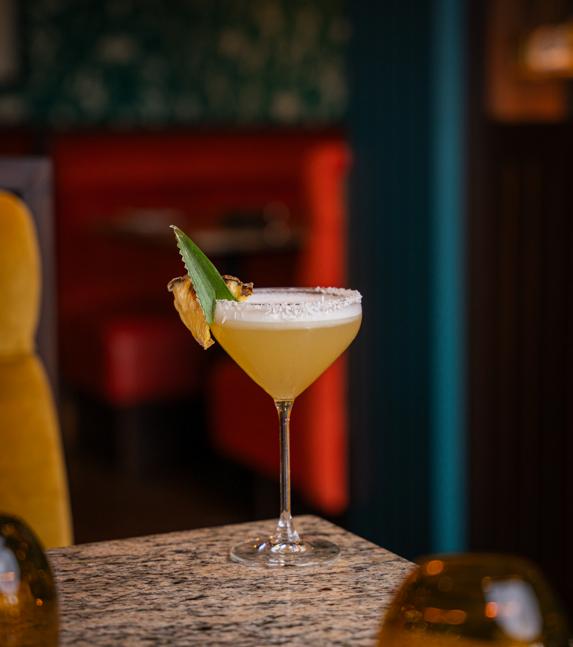
Beleza is establishing itself as one of the country’s most exciting emerging dining brands.
The restaurant will span 6,000 sq. ft. and accommodate up to 147 guests. It will also feature a heated outdoor terrace seating 50, and private dining spaces, ideal for groups, colleagues and celebrations, offering a premium and lively dining experience.
Book at: www.belezarodizio.co.uk/ book-solihull/
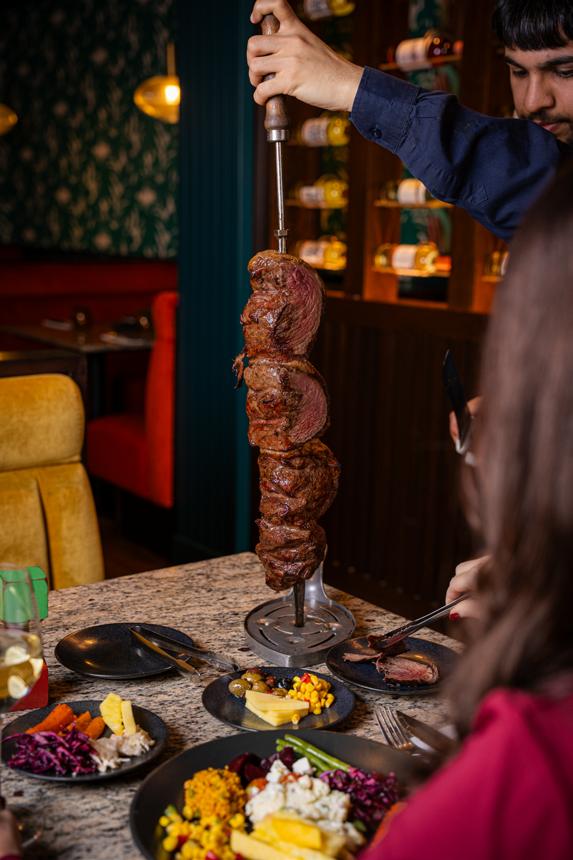

Melody Adams, the restaurateur behind Lurra and Donostia, redefines French food with Maset.
Maset opened its doors this November, inviting Londoners to dive into French coastal cuisine from the Occitania region.
Set on the buzzy, sophisticated Chiltern Street, Maset brings French food with a modern difference. Offering a lighter, brighter style of cooking, synonymous with the region and gently influenced by North Africa, Italy and Spain.
The menu offers a distinct change from traditional French restaurants, reflecting Melody’s time spent in the Occitan region and celebrating seasonality and British locality.
Dishes unfold over five sections: Merenda, to start, les plats, sides and desserts, menu highlights include Bouillabaisse croquettas, Pâtes au Pistou, Monkfish, Camargue rice, and Preserved Lemon Martini. Wines are sourced primarily from small vineyards in France, Italy and Spain curated to be different from the usual wines.
Cuisine de Sud is rooted in the history, the land and culture of the Occitan region. Maset takes inspiration from the region’s rich cuisine and heritage.
The founders have spent years travelling through the South of France and bring to London their passion and unique interpretation of the region’s cuisine. Their vision stays authentic, celebrating the flavours and community of French food.
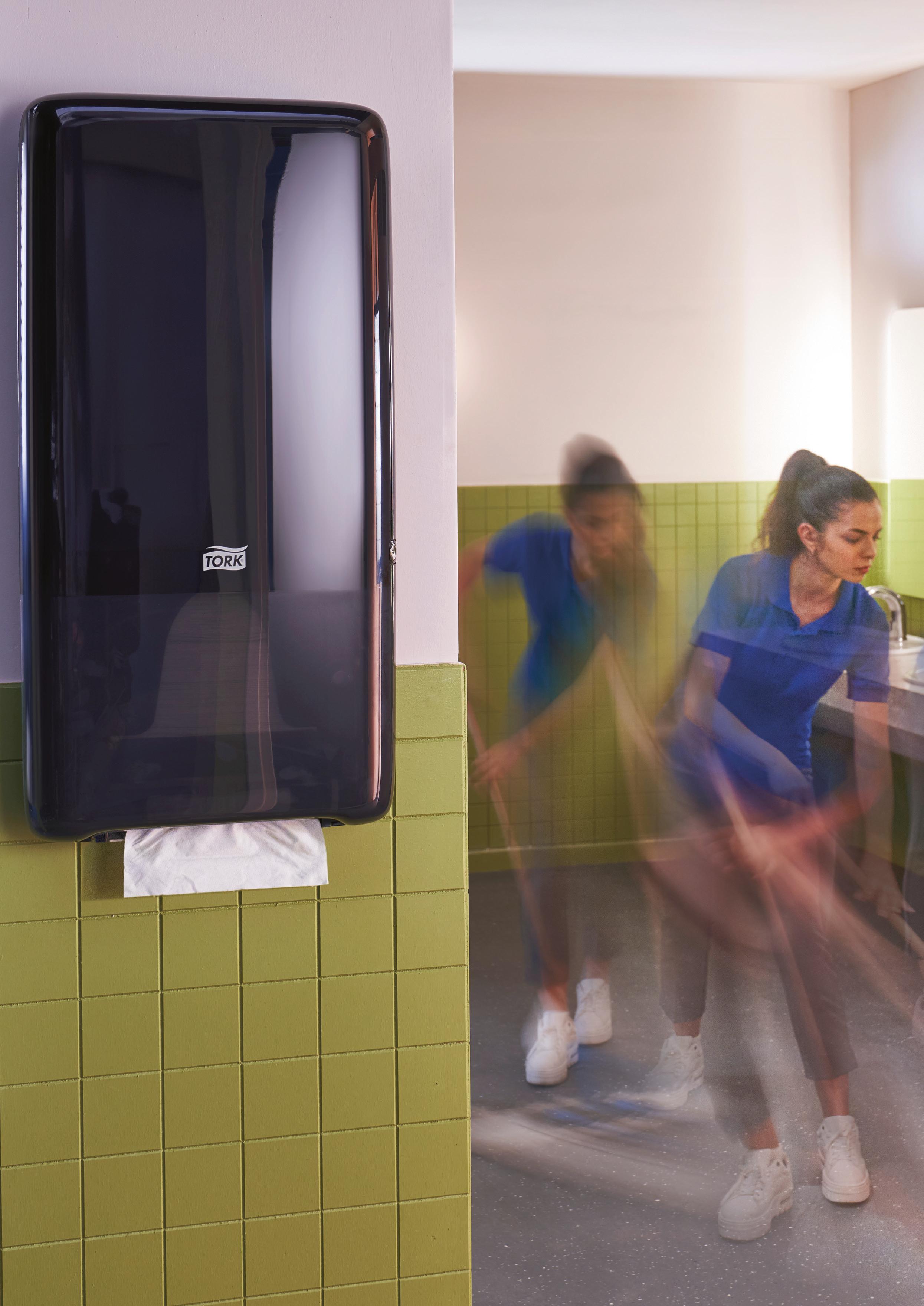
First impressions count for so much in the luxury hospitality industry, so every effort needs to be made to keep venues smelling as fresh as possible.
Unpleasant odours, particularly in bathrooms and washrooms, can be an indicator of lower than satisfactory hygiene and cleanliness standards throughout premises.
“Reducing the use of aerosol air fresheners and using air-freshening systems which deliver premium pleasant fragrances will improve the air quality and enhance the ambience of any venue, helping to reassure consumers that premises are clean, fresh, hygienic and safe,” says P-Wave® Brand Manager Mark Wintle at Robert Scott. “A pleasant fragrance can be powerfully emotive, setting the mood, and creating a memorable experience.
“Earlier this year, we added OurFresh 2.0 to our active air freshener range. This professional battery-operated air freshener is designed to keep larger spaces invigoratingly fresh. With no aerosols, propellants, or solvents – just fragrance – OurFresh 2.0 delivers a consistent, sophisticated scent for 30 days straight.”
Ideal for use in luxury hospitality environments, the refills for OurFresh 2.0


are available in three popular premium fragrances – Cotton Blossom, Coconut & Vanilla and Summer Sunshine. OurFresh 2.0 packs 3-5 times more fragrance than average supermarket dispensers, offering superior freshness that spans wider areas, up to 50m².
Freestanding – with no need for screws or tape, or wall-mounted – and available in sleek black or white, the batteryoperated OurFresh 2.0 is designed with convenience in mind. Smart chip technology runs the fan intermittently, turning for longer progressively over the 30-day duration.
“OurFresh 2.0 completes our active airfreshener range, which includes: Easy Fresh; MyFresh; and OurFresh-e,” says Mark Wintle. “In addition, OurFresh 2.0 uses the same premium dry fragrance refills as our fan-favourite OurFresh-e plug-

in. The fragrance refills are made from up to 15% recycled material and are recyclable – so that’s two great dispensers, and one epic refill.”
Even in a 5-star washroom, health matters
Two months ago, P-Wave was proud to announce that it had placed over one million of its NHS England branded Slant6 urinal mats in men’s washrooms across the country, from restaurants, hotels and offices to pubs and shopping malls and stadiums.
“According to the Office for National Statistics there are over 25 million men in England, and we estimate that at least a quarter use a urinal once a day, so our 30-day urinal screens are taking the essential health message – “Blood in your pee? Contact your GP practice” – to many millions of men every day.
“Last autumn, we launched a new Slant6 Midnight Coast limited edition urinal screen, aimed at the luxury hospitality sector, and featuring the important NHS England men’s health message.
“More upmarket than a celebrity chef’s tasting menu, the sleek, black urinal screen allows guests to indulge in a refreshing aquatic fragrance, balanced with green palm leaves, fruity and floral hints, all layered over driftwood and white musk. And while they enjoy the luxury, they will also be reminded of an important NHS cancer awareness message – because even in a 5-star washroom, health matters.”
With a range of products that are ideal for the hotel sector, shower brand Kinedo, part of the SFA Saniflo Group, has booked its place at HIX Expo at London’s Business Design Centre on 26th & 27th November. As Europe’s only hotel design event that focuses on the entire design and interiors supply chain, it attracts over 5000 attendees, including interior designers, specifiers, architects and developers, as well as procurement personnel and hotel operators.
It is the first time the company has taken a stand at this annual event and, as such, Kinedo stand A81 is shaping up to be a stunning preview of how a Kinedo bathroom could look in

any hotel room. The stand features two distinct room sets designed to showcase the contrast between high-end and a more budget-friendly solution – without compromising on looks.
Room set one features the upmarket Solo Design walk-in enclosure with brushed gold profile and art deco glass. It is paired with a Kinediva white tray, with its unique water flow design and two designs from Kinedo’s impressive Kinewall wall panelling collection - luxurious black marble with white and gold and Walnut Pencil wood design.
Room set two features another Solo Design walk-in, but this time with brushed stainless-steel profile and Cosmos glass – an opaque effect glass offering an attractive privacy option. This is teamed with the popular Kinemoon Style tray in anthracite and Kinewall woven and rosette designs in Linen colour.
At the entrance to the stand is the eye-catching Giraffe Kinewall panel which means that the Kinedo stand will most certainly ‘stand’ out from the crowd.
A series of seminars will be held for guests over the two days exploring the theme ‘culture clash’ with sessions addressing innovations in hotel wellness, the shifting definitions of luxury, and crosscultural hospitality experiences.
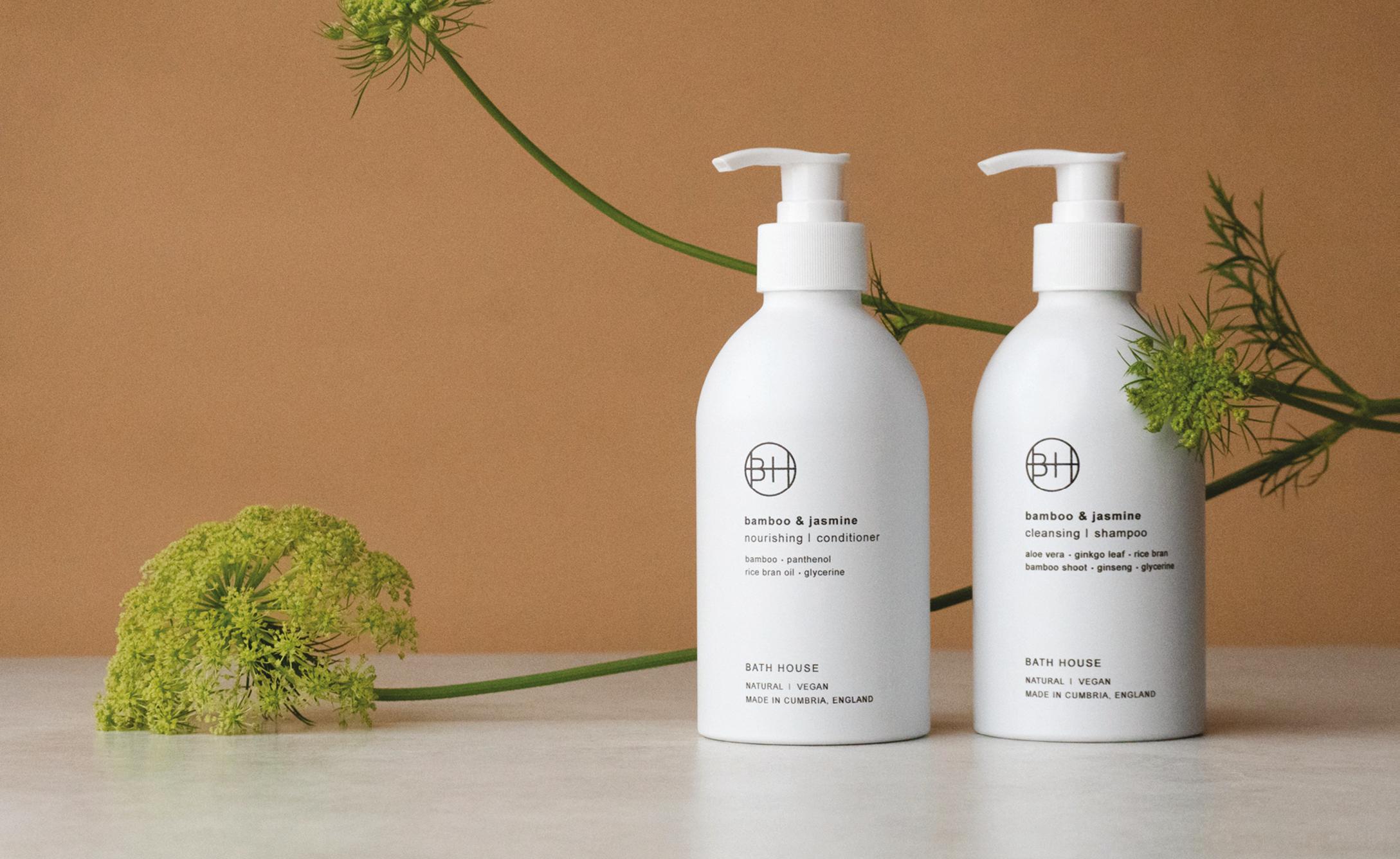


Nestled just outside Rovaniemi in Finnish Lapland, Arctos Lapland presents itself as something more than a typical spa—it’s a family run curated wellnessexperience that melds rustic Finnish tradition with cosy luxury. For anyone seeking a memorable, intimate spell of downtime in Lapland rather than a large resort buzz, this is a compelling pick.
Having arranged a local pick-up with our host, he gave a short, yet in-depth run down of the facilities and advice on making the most of the experience and left us to enjoy and relax for a few hours with minimal interruption. Arctos offers a traditional Finnish wood-heated sauna
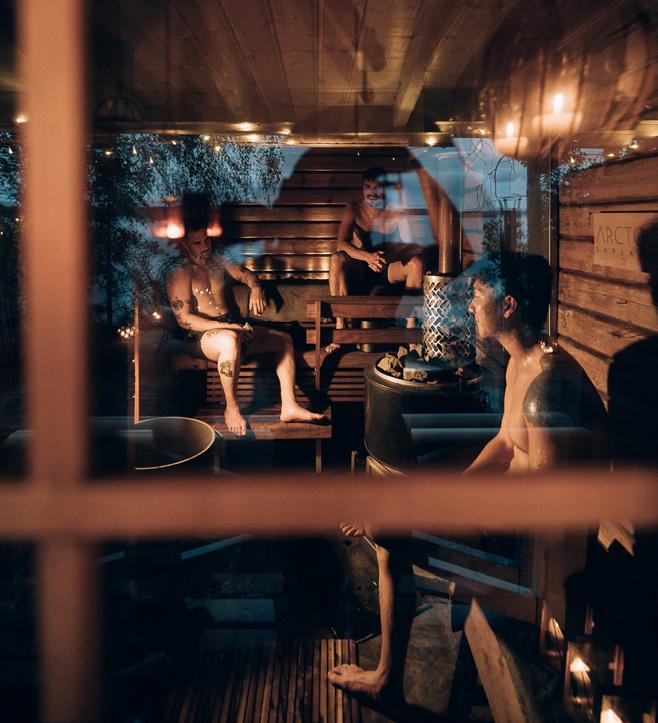
cabin, where we began our session by warming up and easing into things. The sauna also includes various aromatic scents and a birch whisk to stimulate circulation. We were advised that we should consider alternating between heat and cold to the get full benefit. This meant taking a plunge into a carved-ice hole in the lake (in winter) or immersion in the clear water of the Arctic lake. Perhaps bizarrely, this was a personal highlight, going from the heat of the sauna and stepping neck-deep into the frozen lake does give an exhilarating feeling, then it was back to the sauna to repeat the process. Towels, bathrobes and slippers are provided.
Following the sauna session, guests can relax in a traditional wood heated outdoor hot tub overlooking the lake— steam rising in crisp air, views of the surrounding forest, sometimes even the aurora in the evening sessions.
Between sessions, there’s a cosy lounge room with wood-burner for relaxing and in the outdoors there is a fire-pit where guests are invited to toast marshmallows and grill hot-dogs whilst taking in the winter landscape.
Sessions are private, for couples or small groups and the host affords personalised
attention when required – a walkie-talkie is provided if assistance is needed. The experience is enhanced through the aesthetics. Not only is there the natural beauty of the landscape, but there are the additional lowlight emitting lanterns, a soft glow from the hot tub lights and fairy lights adorning the cabin and reindeer skins add comfort and warmth to the outdoor seating. The thoughtful small touches are fully appreciated – the provision of marshmallows, cookies and hot-dogs, as well as tea, water and soft drinks for during the session.
Arctos Lapland is a standout choice in Rovaniemi for those seeking to blend immersion in local spa/tradition culture with luxury, privacy and nature. If you’re visiting Lapland and want to treat yourself to something more than a standard hotel sauna, this experience delivers - it’s about quality, calmness and nature-connection. If you are a couple seeking a serene romantic escape or a small family looking for a memorable relaxing experience with an insight into Finnish sauna culture, then Arctos Lapland will more than match your expectations.
Maria Lapthorn
EDITOR




In 2026, travel takes on a new rhythm— one defined by curiosity, connection, and a return to authenticity. For those who travel not to escape the world but to understand it more deeply, adventure and indulgence are now kindred spirits.
From the high pastures of Central Asia to Africa’s vast savannahs, the coming year invites discovery on a grand yet graceful scale. Guided by insight from Wild Frontiers, these are journeys where refinement meets raw beauty, and where luxury lies in experience itself.
Kyrgyzstan – Nomadic Heritage & the World Nomad Games
Kyrgyzstan stands at the crossroads of tradition and wilderness—a land where hospitality is woven into the rhythm of nomadic life. As the World Nomad Games return, the country takes centre stage in celebrating its equestrian heritage and timeless artistry. Guests can settle into softly furnished alpine yurts, sip fermented mare’s milk beneath the stars, and ride through sweeping valleys framed by snow-capped peaks. During the British summer (June to August), gentle warmth and clear skies reveal Kyrgyzstan at its most inviting.
In Tanzania, nature’s spectacle unfolds in cinematic form. From the vast Serengeti plains to the Ngorongoro Crater’s emerald rim, each landscape tells a story of life unfiltered and untamed. Private guides offer quiet moments of awe—an elephant herd at dawn, the shimmer of wildebeest on the horizon— while boutique camps combine natural immersion with elegant restraint. This is safari redefined: adventure wrapped in comfort, guided by a reverence for the wild.



Guided by insight from Wild Frontiers, these are journeys where refinement meets raw beauty, and where luxury lies in experience itself.
South Korea has entered its moment. Here, centuries-old palaces sit beside avant-garde galleries, and tradition breathes effortlessly alongside innovation. Spring’s cherry blossoms and autumn’s golden light frame a nation in renewal. Travellers can discover the country’s poetic contrasts—from the serenity of tea ceremonies and temple stays to the pulse of Seoul’s design districts. It’s a journey into both heritage and horizon.
Egypt’s magic lies not only in its past but in its poise. As the Grand Egyptian Museum prepares to open its doors, the country is ready to reintroduce itself to the world. Along the Nile, intimate dahabiya cruises trace the river’s timeless course, while desert lodges offer tranquillity among the dunes. Between October and April, soft sunlight bathes temples and tombs alike, revealing the eternal elegance of this ancient land.
Sri Lanka’s beauty lies in its diversity— tea country mist and coastal calm, sacred peaks and sapphire seas. Travellers can watch blue whales breach off Mirissa, cycle through emerald paddy fields, or retreat to boutique sanctuaries nestled in the hills. Here, every journey is balanced by grace: adventure softened by spa rituals, exploration framed by exquisite hospitality. Each coast, each season, reveals a new side of the island’s soul.
Across the globe, destinations continue to unfold in quiet splendour. Japan’s devotion to craft, Oman’s desert silence, Patagonia’s sculpted landscapes—each invites travellers to move more slowly, to look more closely, and to feel more deeply.
In 2026, luxury is defined not by excess, but by experience—by the stillness found in wild places, and the stories shared along the way. For those seeking journeys that resonate long after the return home, the world awaits with open arms and untold beauty.






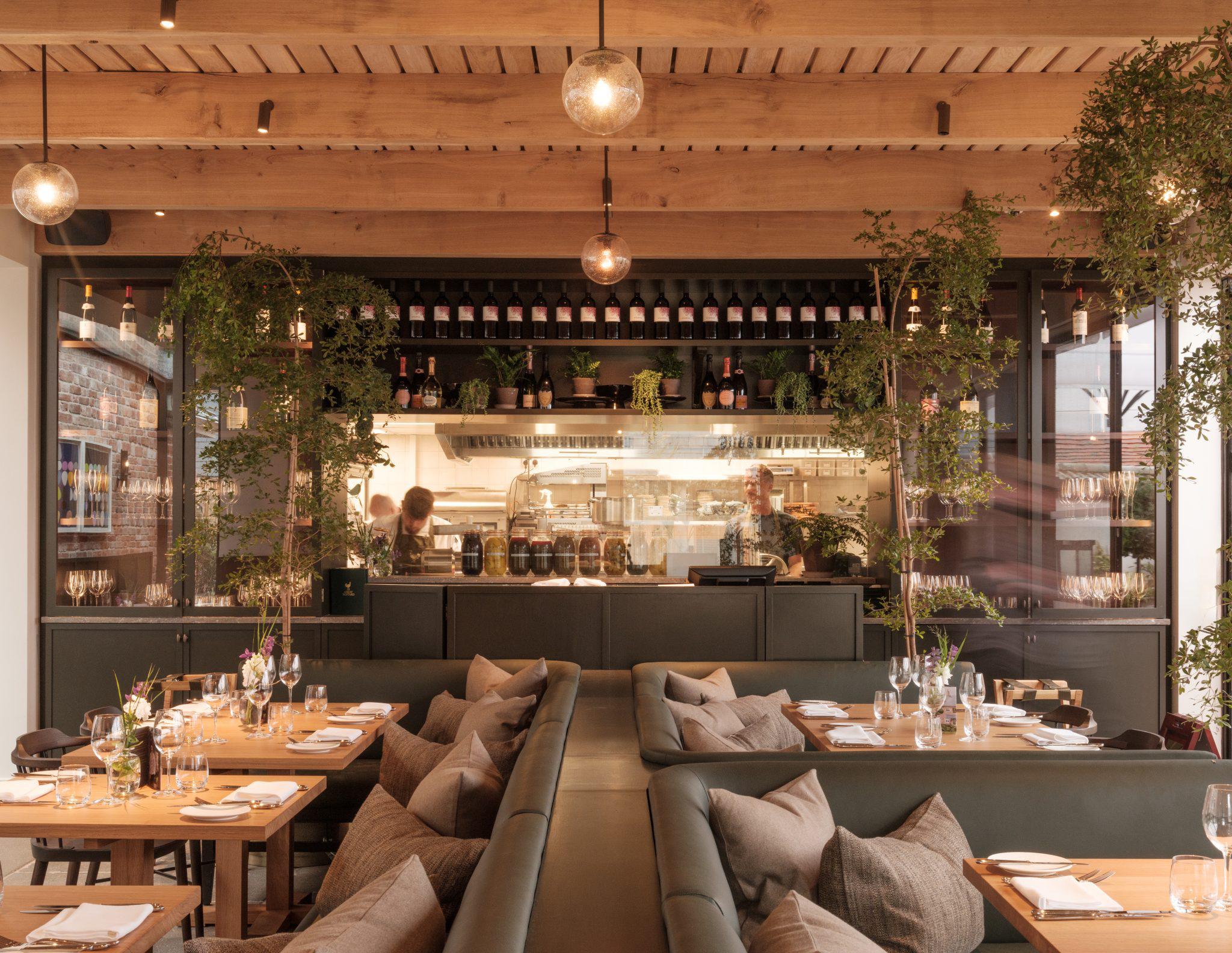
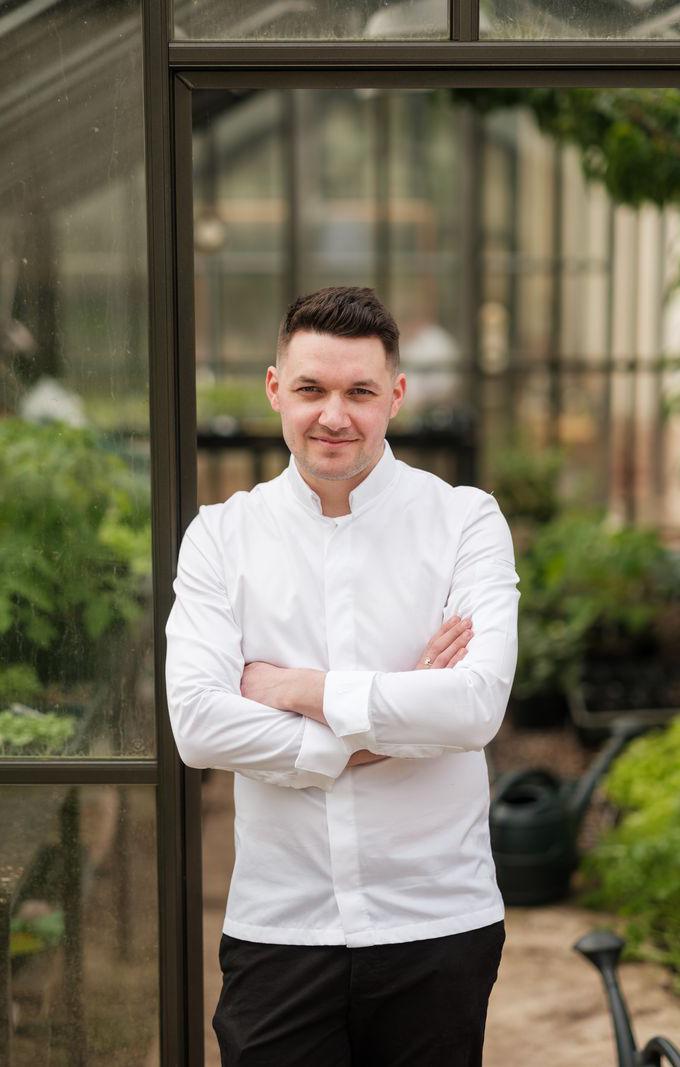
FROM MOOR HALL TO THE WOODFORD VALLEY: A CONVERSATION WITH CHEF JORDAN OF THE GREAT BUSTARD
The Great Bustard is fast becoming one of the UK’s most exciting gastro destinations—an escape where luxury meets rustic charm, and sustainability is more than just a buzzword. At the helm of its culinary offering is Chef Jordan, whose fine-dining roots at the two-Michelinstarred Moor Hall have profoundly shaped his approach to food.
In this interview, Chef Jordan shares how his time at Moor Hall transformed his philosophy, the joys and challenges of working with estate-grown produce, and how The Great Bustard is redefining what it means to be a truly sustainable country pub.

Chef Jordan, your journey began at the prestigious two-Michelin-starred Moor Hall in Lancashire. How did your time there shape your approach to cooking, and what elements of fine dining do you carry with you into your work at The Great Bustard?
Working at Moor Hall truly opened my eyes to working with produce that is growing right outside the door. It really gave me a greater appreciation for the time and effort it takes to grow and source your own produce, rather than simply ordering from a supplier and getting it delivered the next day. Working with fresh, local produce can take weeks, even months of planning, and a whole team to bring it into us. There is another level of excellence in sourcing from farms that are within a few miles radius of the restaurant - not only does it keep the carbon footprint down, but I truly believe you can taste the freshness of produce picked and served the very same day. The foreplanning involved in working with fresh, local and seasonal produce has really shaped my approach to cooking. At The Great Bustard, I use this same approach working with local producers, as well as sourcing produce straight from our Estate.
The Great Bustard stands out for its focus on seasonality and locally-sourced ingredients. How do you decide what to feature on your menu each season, and what are some of your favourite ingredients from the Great Durnford Estate?
At The Great Bustard, we are incredibly fortunate to receive a vast amount of produce from the Estate - not just fruit and vegetables from the Kitchen Garden, but also fresh game, top quality lamb and fantastic mushrooms. These are staples on our menu throughout the year and we showcase this produce in various ways across all menus.
At The Great Bustard, we are incredibly fortunate to receive a vast amount of produce from the Estate - not just fruit and vegetables from the Kitchen Garden, but also fresh game, top quality lamb and fantastic mushrooms. “ “ “
Here at The Great Bustard we are so fortunate to have amazing produce straight from our Estate and we are very conscious to maximise all produce.
I also particularly love the arrival of Spring, as I have a chance to get out foraging wild garlic and elderflowers and berries – some of my favourite ingredients. These grow in abundance around the Estate, so it’s also incredibly fun for the kitchen to work together to find interesting and unique ways of preserving these ingredients, such as pickling and dehydrating, which enables us to both minimise waste and use the produce all year round.
One unique feature of your menu is the incorporation of game and foraged ingredients. Can you tell us how you source these ingredients, and what role they play in setting The Great Bustard apart in such a competitive gastro pub market?
Here at The Great Bustard we are so fortunate to have amazing produce straight from our Estate and we are very conscious to maximise all produce. For example, with the Estate venison, we use all the prime cuts on our A la Carte Menu, then mince or braise the trim to make into our wonderful pies and burgers for the pub. Even the bones are roasted and made into stocks and sauces. This applies for all game – we use any trimmings for dishes such as our terrines or bar snacks. This approach extends beyond our meat - we also ensure zero waste from our mushrooms. After prepping, we ferment all the trim into a fermented mushroom stock and then dry the pulp into fermented mushroom powders.
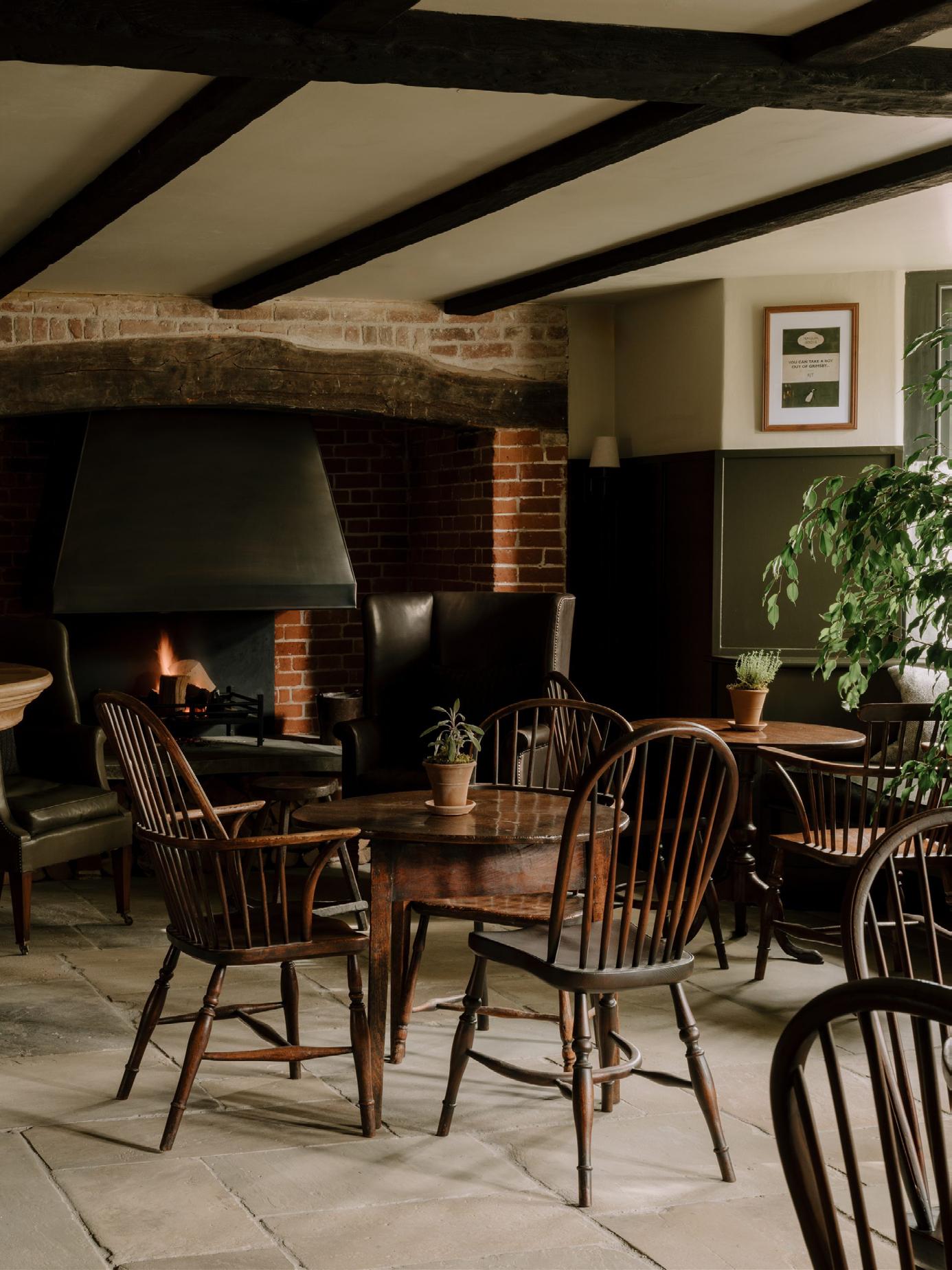
We also make the most out of every season by foraging what we can from the Estate and surrounding areas then pickling, preserving and fermenting the produce to use all year round.
As a chef passionate about sustainability, how do you engage with the local community in terms of food sourcing? We understand visitors to the estate even bring in their own catch from the River Avon – how does this collaboration fit into your menu philosophy?

We pride ourselves on being a place for the community and engaging with our locals is a top priority. We build strong relationships with the familiar faces we see at the bar regularly throughout the week. Many of the regulars are keen fishermen and are always catching the most incredible fresh trout.
They were keen not to see these catches go to waste and asked if we would be interested in taking them, which of course we jumped at the opportunity. We cook the trout many different ways but the main thing we do is cure and smoke it. We repay this kindness by cooking them up the fish that is brought in so they can really enjoy the fruits of their labour!
With a treatment room, ten beautiful bedrooms, and an on-site farm shop, The Great Bustard offers much more than just food. How do you view the relationship between the food offering and the overall experience at The Great Bustard, and how does this impact the way you design your menus?

A
glass of our very own Otarda wine from our Tuscan sister Estate enjoyed by the fire makes for the perfect night cap before bed.
“ “
The Great Bustard is so much more than just a pub - it is a retreat. We are a destination for the locals to gather and also for everyone else to get away from the chaos of everyday. It is a place where you can come to switch off and enjoy the slow pace of the county. Stay the night in our stunning rooms which ooze luxury without losing sight of those home comforts! Go for a mindful walk around the countryside or relax with a spot of fishing, then enjoy a drink with the locals before you get ready for dinner and tuck into first class food. A glass of our very own Otarda wine from our Tuscan sister Estate enjoyed by the fire makes for the perfect night cap before bed. Wake up to our homemade breakfast – chef’s crumpets, our freshly baked English muffins or our legendary duck hash. Why not treat yourself to a massage or facial before you head home? And of course, don’t forget to pop into our farm shop on your way back to the car to stock up on lots of lovely local produce and our Durnford beauty products made right here in the village.
Looking ahead, what exciting developments can we expect from you at The Great Bustard? Are there any new dishes, concepts, or sustainability initiatives you’re excited to explore in the near future?
The Great Bustard is a young business but growing fast. We are always exploring new avenues we can expand and progress as a company, which I love because it constantly keeps my mind excited and engaged and us as a team moving forward. We have lots of ideas we can’t wait to turn into reality - from growing our farm shop offering and filling it with even more lovely, local produce to running tours exploring our area to showcase the incredible produce we have right on our doorstep. We also love the idea of working and collaborating with other amazing restaurants and chefs. There are so many fantastic places and people in our industry who we want to celebrate here at The Great Bustard, so definitely some exciting things to come.
Specifying CFA members for your flooring projects means you’ll be gaining a wealth of experience from vetted contractors with the knowledge and products to fulfil your specification with a sustainability criteria.
CFA members are part of a supply chain that includes specialist contract flooring contractors, manufacturers and distributors, all promoting the highest standards and expertise.

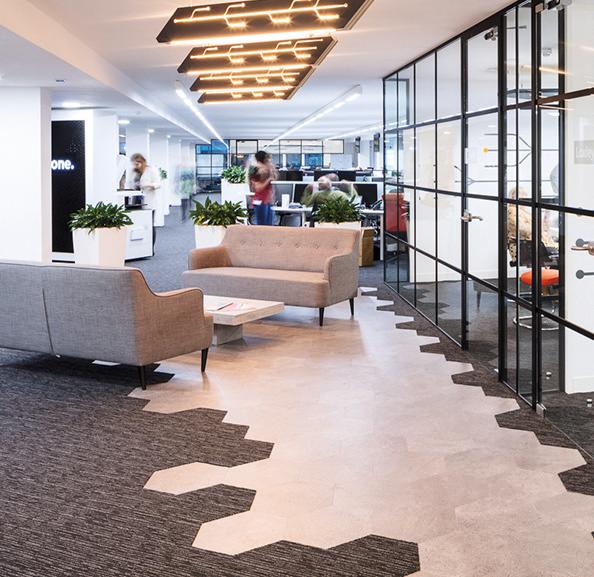





Ardbeg House, a boutique luxury hotel on the picturesque island of Islay, Scotland, has opened its doors as a truly immersive whisky and hospitality experience, with a newly installed Stannah Stairiser CR2 inclined platform lift providing guests with full accessibility to upper floors.
Featuring twelve individually themed bedrooms, the hotel combines luxury, creativity and storytelling inspired by the island’s famous Ardbeg distillery and heritage. The hotel interiors include striking copper wall art, a customdesigned boat chandelier and interactive features including buttons labelled Press for Smoke, which release a smoky whisky scent. Guests can also enjoy tours of the local distillery and a quality food and drink menu with an Ardbeggian twist.
Designed in collaboration with Russell Sage Studio, Ardbeg House honours the heritage of Ardbeg while creating immersive spaces that reflect the island’s culture and the distillery’s iconic history. Over 20 local and Scottish architects contributed to weaving Ardbeg’s story into the hotel’s design, which also involved seamlessly integrating the Stannah Stairiser CR2 with customised solutions. Stannah Lifts collaborated
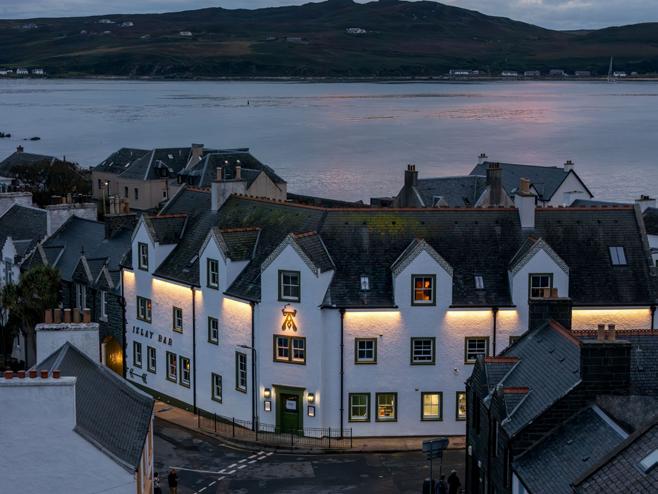
closely with Russell Sage Studio and main contractor Thomas Johnstone to supply a custom lift solution that met both the functional and aesthetic requirements.
The hotel required a custom solution to provide disabled access to its upper floors, which presented three main challenges. The first challenge was accessing the island, as transporting equipment involved careful planning and coordination with ferry services to ensure timely delivery and installation without disrupting the renovation schedule.
The second challenge was addressing the space constraints. The hotel had no space to accommodate a passenger lift, so an inclined platform lift was the best option. However, the staircase area was small, requiring a compact design. Following a detailed assessment of the space, a Stannah CR2 inclined platform lift was chosen as the ideal solution. The lift’s slimline design further minimised wall projection, and the platform folds neatly when not in use, preserving staircase space. The platform dimensions of 800mm by 1000mm comfortably accommodate a wheelchair and user, while raised ramps and safety barrier arms ensure secure and safe operation.
The goal was to provide safe and reliable access for wheelchair users without disrupting the visual appeal of the hotel interiors. To achieve this, a bespoke colour was selected for the platform lift, ensuring it blended seamlessly with the surrounding walls and décor.
The Stairiser CR2 now provides safe and reliable access to the two upper floors

of Ardbeg House, allowing all guests to enjoy the hotel’s immersive and unique experience. Equipped with remote call stations, wheelchair users can summon the lift independently from the top or bottom of the stairs, ensuring convenient operation.
Designed for use on a curved rail, the Stairiser CR2 follows the natural flow of the staircase while keeping outward projection to a minimum. This innovative feature makes the Stairiser CR2 equally well suited for installations featuring a single turn, multiple landings or spiral configurations.
To ensure the stairlift complemented the hotel’s rich Ardbeggian interiors, the rail and carriage were finished in a custom green paint specifically chosen to match the hotel's décor. This carefully considered design decision allowed the lift to feel like a natural part of the space, making the lift an integral element of the storytelling and design.
With the installation of the Stairiser CR2 completed in just two days, Ardbeg House continues to offer a world-class whisky and hospitality experience that is now fully accessible to every guest.
For more information, visit: www.stannahlifts.co.uk


City Lodge Hotels and its long-time agency partner, TBWA\Hunt Lascaris, have taken top honours at this year’s Effie Awards, winning the coveted Grand Effie for their standout “Save Our Stay (SOS)” campaign that ran from October 2024 to January 2025.
The Effie Awards celebrate marketing excellence that drives real business results, recognising creativity proven to deliver measurable impact.
In addition to the Grand Effie, the SOS campaign also won the following awards:
• Gold Effie: Travel & Tourism
• Silver Effie: Media Innovation / Commerce & Shopper
• Silver Effie: Marketing Disruptors
Also credited as contributing partners on the campaign were PHD South Africa, OnPoint PR and Lifestyle Management, and Instreem.

The Tokyo EDITION, Toranomon has announced its No.45 ranking on The World’s 50 Best Hotels 2025 list, marking a milestone as the first EDITION property ever to be featured on this prestigious global ranking.
Created in collaboration with internationally renowned architect Kengo Kuma, Marriott International, Mori Trust, and Ian Schrager, the hotel occupies the 31st to 36th floors of Tokyo World Gate and offers unobstructed views of the city skyline, including Tokyo Tower. Together, these elements create a sophisticated design language
that subtly celebrates Japan’s rich culture.
Organised by 50 Best, The World’s 50 Best Hotels 2025 is an internationally recognised platform that celebrates the best venues the world has to offer, as voted for by a global panel of more than 800 industry experts.
This recognition underscores The Tokyo EDITION’s dedication to offering guests an unforgettable stay, where architecture, exceptional dining, and top-level service come together to create a destination and a gateway to Tokyo’s cultural riches.

The Domaine de la Klauss (Relais & Châteaux), nestled in Montenach, Moselle, received double recognition at the prestigious World Luxury Hotel Awards ceremony.
An international accolade that celebrates the excellence of this Lorraine property, already a mustvisit for lovers of art de vivre and fine gastronomy.
Among the distinctions, the Domaine proudly earned the title of “Luxury Romantic Hotel in the World”, the most symbolic award, as well as “Luxury Small Hotel in Europe.” These two honors further strengthen the international visibility of this 28-key Relais & Châteaux property, renowned for its Gemology spa and highly personalized hospitality.
On the culinary side, the Michelinstarred restaurant Le K, led by Chef Benoît Potdevin, was awarded “Best Contemporary Cuisine in Europe” and “Most Romantic Atmosphere.”
The Chef received his award on stage alongside Grégoire Prigent, the restaurant’s maître d’, symbolizing the success of a passionate and demanding team effort.
A memorable evening for the entire Klauss family, further confirming the Domaine’s position among Europe’s most exceptional destinations.
AlUla’s reputation as a world-class destination for hospitality and gastronomy has been further elevated with the inclusion of several of its hotels and restaurants in the Michelin Guide 2025.
Among the Michelin Guide Hotels, Banyan Tree AlUla has been distinguished with One Michelin Key, a mark of excellence that recognises outstanding hospitality and service. It is among the first seven hotels in the Kingdom to receive the prestigious Michelin Key distinction. Set amid the sandstone canyons of the Ashar Valley, the five-star Banyan Tree AlUla combines minimalist luxury with a strong connection to nature, offering guests a sanctuary of serenity and sustainable design.
The Chedi Hegra, the first hotel to be located within a UNESCO World Heritage

Independent Peak District hospitality group Longbow Venues has celebrated a remarkable night of success at the 2025 Westside & Southside Restaurant & Bar Awards, taking home three major accolades that highlight the group’s continued commitment to quality, local produce, and genuine hospitality.
Site, was highlighted by Michelin as a new destination to watch. Also featured in the guide is Dar Tantora The House Hotel, an eco-hotel set within AlUla Old Town, known for its labyrinthine streets, mudbrick houses and imposing fort.
Our Habitas AlUla, a lifestyle resort that champions sustainability and wellness, and Caravan by Habitas AlUla, offering a laid-back, adventure-inspired stay under the stars, have also been featured on the coveted list.
In the Michelin Guide Restaurants selection, Joontos at Dar Tantora The House Hotel was awarded the coveted Bib Gourmand, recognising exceptional cuisine at outstanding value. The restaurant, located within the intimate Dar Tantora property, brings together traditional Saudi flavours with a creative, contemporary twist.

The Westside & Southside Restaurant & Bar Awards are run by Westside Magazine and celebrate the best restaurants, pubs and bars across Sheffield and North Derbyshire. Winners are selected by an independent panel of industry judges (with a Readers’ Choice category).
The glittering awards evening, which was held at the OEC Sheffield on Monday 27 October 2025, saw Longbow’s venues recognised across several key categories:
• Restaurant of the Year - The Peacock at Rowsley (for the second year running)
• Best Sunday Lunch - The Ashford Arms, Bakewell (for the second year running)
• Best Family Favourite - The Maynard, Grindleford
On top of that, the group’s The Peacock at Owler Bar was a finalist for
Harrat at Banyan Tree AlUla, renowned for its elevated Saudi-inspired fine dining, and Tama at Our Habitas AlUla, celebrated for its farm-to-table menus crafted from locally sourced produce, were also recognised for their distinctive culinary excellence and contribution to AlUla’s dynamic dining scene.
This milestone reinforces AlUla’s emergence as one of the region’s most captivating destinations for travellers seeking world-class hospitality, luxury and gastronomy, set amid natural landscapes.

Best Dining Pub and The George at Hathersage was a finalist for Best Hotel Restaurant.
In a show of appreciation, Longbow Venues founder and managing director Rob Hattersley brought more than 50 team members to the ceremony - colleagues from all venues alongside the marketing, accounts, and recruitment teams - so they could celebrate the achievements together.
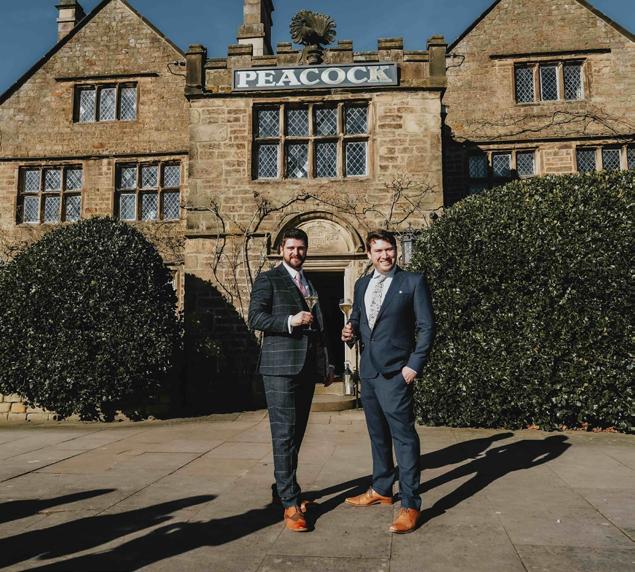
Hospitality has always been a balancing act between guest experience and operational efficiency. Yet in today’s climate of rising costs and heightened expectations, profitability hinges on smarter, more agile approaches. Technology is no longer just a support tool; it is a strategic driver of revenue growth. By embracing the right innovations, hoteliers can strengthen margins, unlock new income streams and ensure long-term competitiveness.
Several core elements shape a hotel’s bottom line. Occupancy rates, while critical, are only one piece of the puzzle. Profitability is also affected by average daily rate, distribution costs and operational efficiency. Energy expenditure, staff turnover and maintenance can quickly erode gains if not tightly managed. Another factor often overlooked is accounting efficiency. Manual or outdated accounting systems can lead to errors, delays, and poor visibility into cash flow. Hospitality accounting can give hoteliers real-time financial insights, helping them spot


trends, control costs, and make faster, data-driven decisions.
Guest expectations also play a defining role. Today’s travellers demand flexible services like personalisation and seamless booking. For property managers and hoteliers, failing to meet these standards risks both reputation and repeat business. Ultimately, profitability depends on striking the right balance between cost control and value creation, with technology acting as a key enabler.
Advanced revenue management systems use AI to analyse demand, competitor rates and booking patterns in real time. This allows hotels to adjust pricing dynamically, capturing maximum value from peak demand while staying competitive during quieter periods. The result is higher average daily rates and improved yield.
Smart building systems can cut utility costs significantly by monitoring energy use and automating lighting, heating and cooling. Predictive maintenance tools also help identify issues before they escalate into costly repairs. For hotels facing rising energy prices, these efficiencies directly translate into stronger margins.
CRM platforms and guest apps enable hotels to collect and interpret data on preferences, behaviours and spending. This intelligence supports tailored offers, targeted upselling and more meaningful guest experiences. A personalised approach drives ancillary revenue while increasing guest loyalty.
4. Streamlined Staffing and Automation Labour remains one of the largest expenses in hospitality. Smart scheduling software aligns staff levels with forecasted demand, preventing both under-staffing and unnecessary wage costs. Self-service kiosks and mobile check-in solutions further reduce pressure on front-desk teams, allowing


5.
While OTAs provide visibility, their commissions eat into profits. Smart booking engines, integrated loyalty programmes and direct marketing campaigns can shift more business to direct channels. The reduction in commission fees improves margins, while building stronger direct relationships with guests enhances long-term value.
Profitability in hospitality is not achieved by cost-cutting alone but by strategically leveraging technology to enhance efficiency and generate new revenue streams. From intelligent pricing and energy savings to datadriven personalization and optimized distribution, smart tech provides the tools hoteliers need to thrive in a competitive marketplace. Those who adopt these innovations early will not only safeguard margins but also deliver the seamless, tailored experiences modern guests expect.
By Jon Giuliani, Chief Revenue Officer, Ximplifi
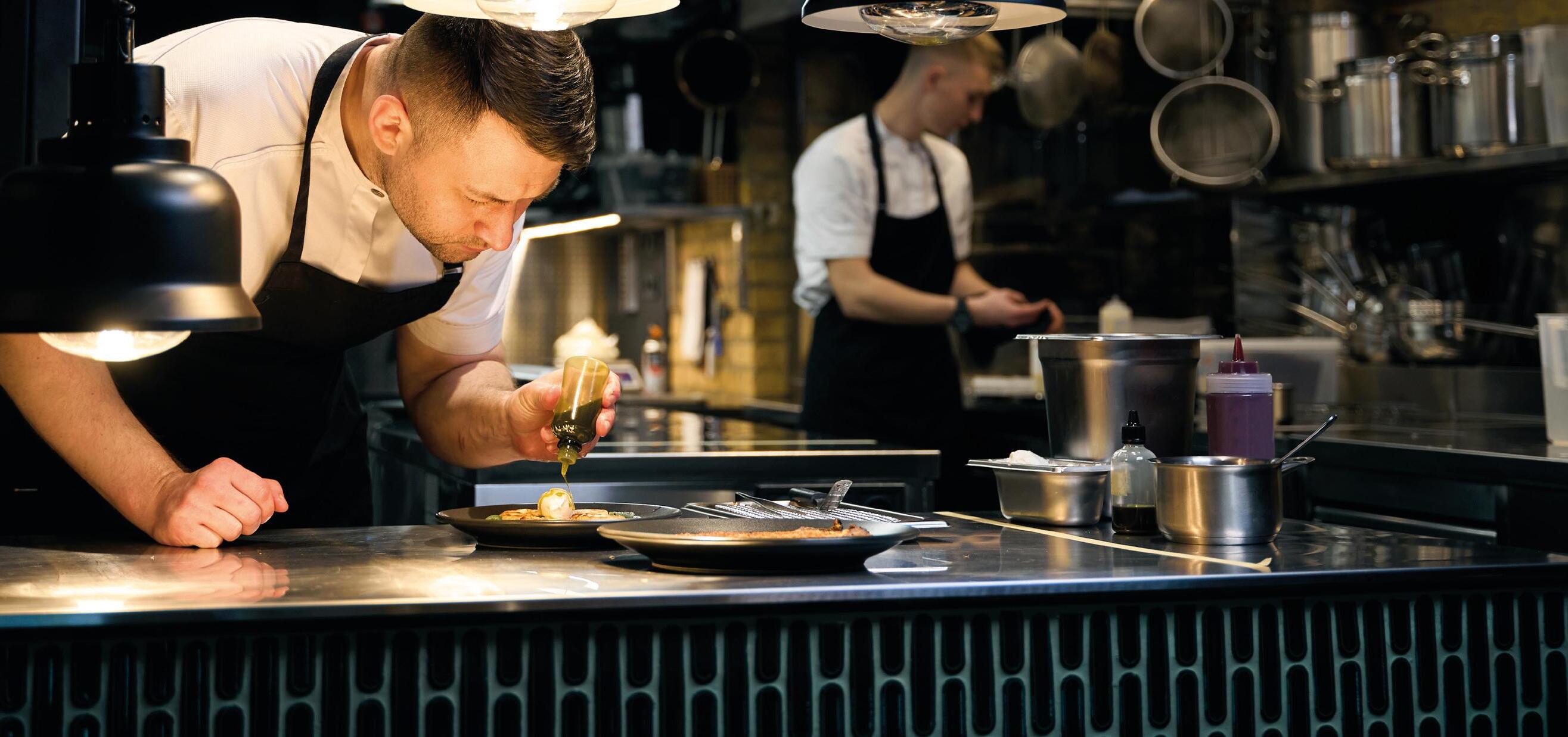
In the high-stakes world of hospitality, true excellence is found not just in the dishes served, but in the technology that make it all possible. For the industry’s most discerning professionals, efficiency and reliability are non-negotiable.
That’s why when it comes to POS systems, the best choose WRS.

Robert Thompson, recently crowned Chef of the Year at the British restaurant Awards, relies on WRS as his sole POS provider. His reason is simple and powerful:
“Thesupportisjustunrivalled,andit’sareal pleasuretoworkwiththeWRSteam.”
This sentiment is echoed by Alain Roux, the visionary Chef-Patron of the historic The Waterside Inn:
“WRSisanallyofourbusiness.Weappreciate theirbespoke,personalservicethatalwaysputs thecustomerfirst.”
At WRS, we do POS differently. A fully connected platform that adapts to your business. Scalable, seamless, and supported by real people. No friction. Just one system built for what’s next.
Visit wrssystems.co.uk to learn more about our tailored solution.
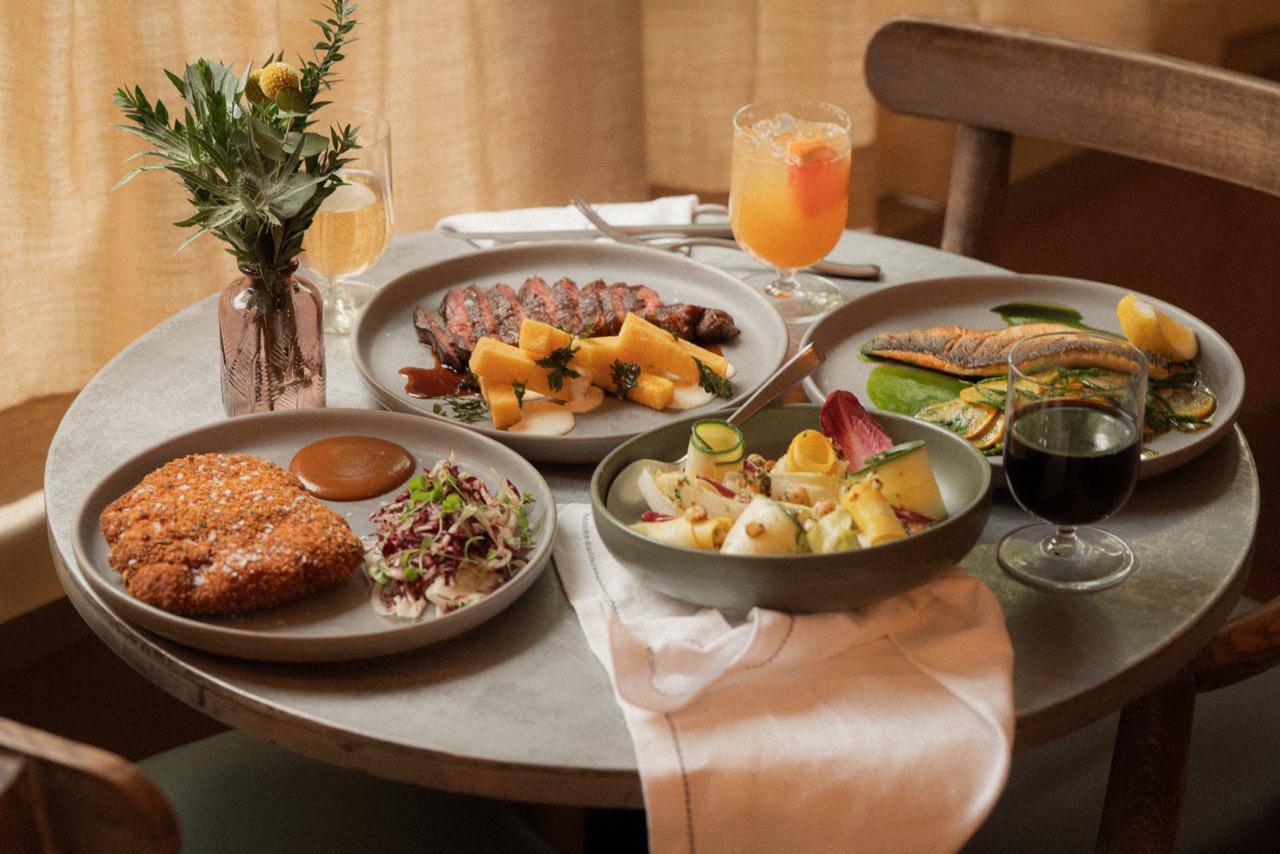
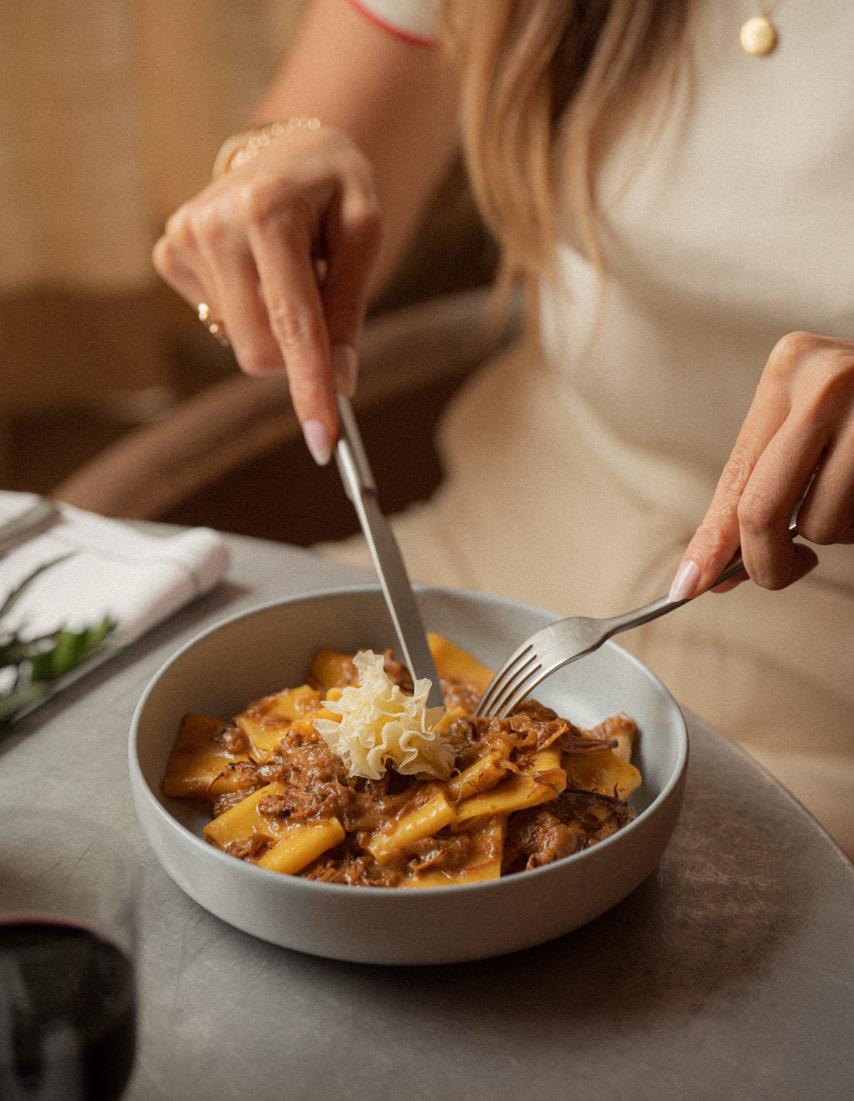
Overlooking Islington Green, Noci offers a calm escape from the city’s pace. We visited on an autumn lunchtime, and the restaurant felt effortlessly inviting. Its modern-rustic interiors — warm wood tones, subtle lighting, and clean lines — created a space that was both relaxed and refined. Families, couples, and groups of friends moved comfortably through the dining room, reflecting the restaurant’s broad charm. Service flowed gently yet assuredly, guiding our meal with attentiveness that never felt overbearing.
Our meal began with a warming surprise — two complimentary focaccias, one soft and tomato-rich, the other aromatic with garlic, both served with extra virgin olive oil. Still warm, the breads were fragrant and comforting, a thoughtful gesture that awakened the palate and hinted at the Italian flavours to come. This small but considered introduction set the rhythm for the meal, balancing comfort and refinement with subtle elegance.
Our starters were equally precise. The Burrata was silky and creamy, accompanied by lightly pickled asparagus, tender broad beans, and a subtle citrus drizzle. Each bite was fresh, textured, and harmonious — the perfect introduction to showcase ingredient quality and restraint. The Beef Carpaccio followed, artfully presented with black olive powder, cream truffle, and fresh herbs. Delicate slices melted under the fork, seasoned to enhance without overwhelming, demonstrating both refined restraint and subtle inventiveness.
Noci’s signature pasta revealed the kitchen’s technical skill and creative touch. The Strozzapreti with creamed courgettes, pine
nuts, and Parmesan was perfectly al dente, light, and nuanced, offering a gentle interplay of texture and flavour. In contrast, the Chianti beef pappardelle delivered richness and depth — slow-cooked beef, tender to the point of melting, paired with crispy shallots in a reduced Chianti sauce that enhanced rather than overpowered the dish. Both dishes exemplified Noci’s meticulous attention to detail, balancing seasoning, texture, and portion size with refinement.
Our desserts were a highlight of culinary invention. The dark chocolate mousse, served with chantilly cream and dried cherries, was rich yet airy, finishing the meal with elegance rather than heaviness. A particular standout was the Tirami-chou, a hybrid of tiramisu and profiterole. Layers of coffee-infused cream and delicate pastry created a playful contrast of textures, transforming a classic dessert into an inventive, precise creation. These desserts revealed a kitchen unafraid to experiment, harmonising technical skill with bold imagination.
The drinks complemented the meal with equal care. A peach and elderflower gin fizz offered light effervescence and bright, floral notes, while a spicy mango margarita balanced gentle warmth with tropical sweetness. Both were invitingly nuanced, enhancing the meal without dominating it and encouraging measured sips alongside conversation.
Throughout, Noci demonstrates a seamless combination of space, service, and cuisine. Starters intrigue the senses, mains satisfy without feeling heavy, and desserts leave a lasting impression.
A
visit in autumn captures the essence of approachable luxury — inventive dishes, precise execution, and a warm, relaxed atmosphere. The complimentary focaccia sets the tone with comforting care, while the starters intrigue and excite.
The staff guide the meal with effortless assurance, allowing each course to unfold naturally. The experience is calm, considered, and wholly welcoming.
A visit in autumn captures the essence of approachable luxury — inventive dishes, precise execution, and a warm, relaxed atmosphere. The complimentary focaccia sets the tone with comforting care, while

the starters intrigue and excite. Pasta showcases technical skill and balance, desserts delight with creativity and playfulness, and the drinks complement each course with subtle complexity. Together, these elements work in synchrony to create a dining experience that feels indulgent yet effortless.
For those seeking Italian cuisine that balances technique, creativity, and atmosphere, Noci delivers with understated assurance. It is a space that feels both familiar and exhilarating, where culinary invention meets comfort and meticulous attention to detail is evident at every stage — from the inventive Tirami-chou to the perfectly seasoned courses. The result is a meal that leaves diners satisfied, inspired, and eager to return, proving that Italian dining at its best can be simultaneously comforting and brilliantly inventive.
Sophie Weir
SENIOR EDITORIAL ASSISTANT

New research from Hilton shows that two thirds of those with a learning disability say their employers have not asked them what they need to succeed in their roles. As a result, nearly six in 10 feel like the company they work for isn’t equipped to support them.
The research of more than 2,000 people in the UK, including 500 people with learning disabilities such as Down’s Syndrome and Autistic Spectrum Disorder, and their carers, gives a clear indication as to how employers can improve experiences and prospects of those questioned.
Working with industry partners has been integral in enabling Hilton to improve workplace support across its UK hotels. For example, Hilton’s 10-year partnership with Aurora Foxes, a hospitality college and training hotel supporting young people with learning disabilities, has provided bespoke training, work experience and employment opportunities to 89 people across Hilton, with 19 former students currently building careers within Hilton’s hotels.
“Moreover, 94% of respondents who have interacted with a person who has a learning disability in a service setting said it was a positive experience.”

Similarly, Hilton’s long-standing partnership with the Down’s Syndrome Association’s WorkFit programme has opened doors for talented individuals, resulting in 55 individuals receiving work placements across the UK with 43 individuals currently working at Hilton hotels.
Moreover, 94% of respondents who have interacted with a person who has a learning disability in a service setting said it was a positive experience. A further seven in 10 say that their experience inspired them to think differently about people with learning disabilities and the overwhelming majority think someone with a learning disability can excel in the workplace.
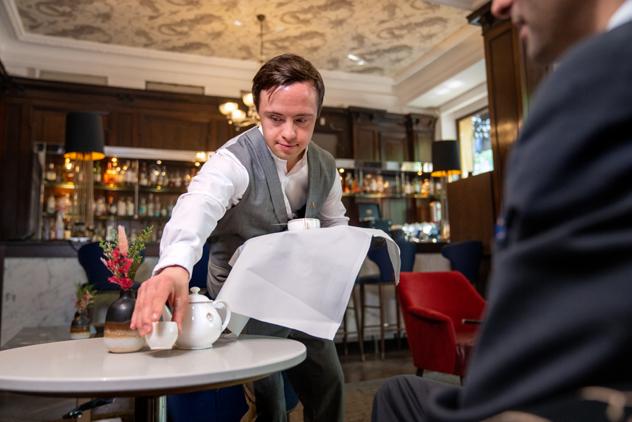

Heston Blumenthal OBE and owner of the Michelin-one starred gastropub The Hinds Head is calling on government and licensees to take urgent action to halt the closure of thousands of UK pubs.
The Great British pub, a cornerstone of community life for centuries, is under threat from rising costs and shifting social habits; pressures that have seen them shut at a rate of more than one per day in the first half of 2025.
Heston Blumenthal OBE, owner of The Hinds Head, said: “Saving the Great British pub is about more than nostalgia – it is about preserving spaces that bring people together, support local economies and keep traditions alive.
“Pubs are at the heart of Britain’s social fabric, offering far more than just a place to buy a pint.
“The pub is a cultural icon, a national treasure and must be protected.
“When a pub closes, it’s not just a business lost; it’s a piece of local heritage and of course somewhere to enjoy a drink and delicious food with great company.”
To reserve your place, visit The Hinds Head, Bray.
UK leading hospitality charity Hospitality Action has unveiled its latest Step-by-Step guide focusing on Activating Wellbeing in Hospitality.
Created in partnership with its annual fundraising initiative, Walk for Wellbeing, the guide - the third in the series - highlights the importance of tackling the wellbeing challenges faced by hospitality workers and has been designed to help businesses and individuals across the industry take practical steps to support employee mental health and wellbeing.
Hospitality Action’s latest Taking the Temperature survey found that while 78% of employees feel more comfortable talking about mental health than they did five years ago, issues such as understaffing, excessive
workloads and poor life balance continue to have a negative impact across the industry.
“The guide points to effective solutions such as Hospitality Action’s Employee Assistance Programme, which offers 24/7 confidential support, financial guidance and counselling services to anyone working in the sector. It also encourages employers to put movement and connection at the heart of workplace wellbeing.”
The guide points to effective solutions such as Hospitality Action’s Employee Assistance Programme, which offers 24/7 confidential support, financial guidance and counselling services to anyone working in the sector. It also encourages employers to put movement and connection at the heart of workplace wellbeing.
From team walks and informal gatherings that strengthen relationships, to simple initiatives that promote balance and openness, the guide shows how small, practical steps can make a big difference.
Walk for Wellbeing is a perfect example of how movement and connection can be built into team culture, creating space to support both individual and collective wellbeing.

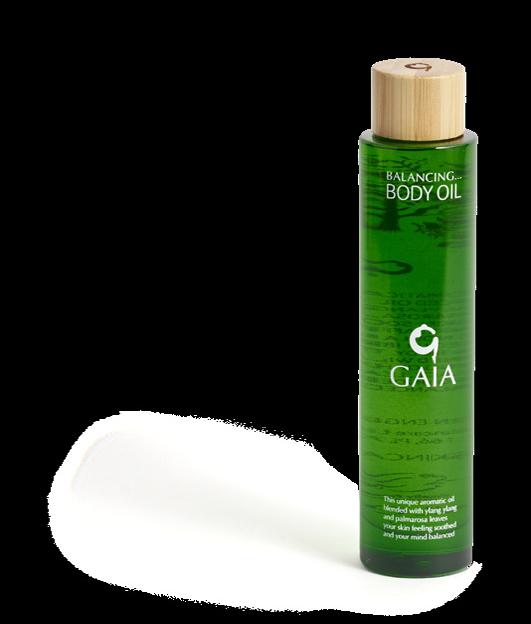


With increased focus on food safety incidents, what can restaurant owners and managers do to hit the headlines for the right reasons?
Bad news stories are guaranteed to create interest – a one-star hygiene rating, allergy incident or shocking trip advisor review will bring negative attention and affect new and existing custom. But a proactive approach to food safety, and an intelligent social media style can help you avoid the pitfalls and deal with unexpected challenges.
Reach for 5 stars
The food hygiene rating scheme offers customers an insight into your business before they step through your door, so working towards that five-star sticker really is a no-brainer. An EHO audit can feel intimidating, but much like public speaking, if you’re well prepared, you can face it with confidence.
Undertaking your own audit keeps you a step ahead, identifying areas of weakness and giving you the opportunity to plan and undertake remedial action BEFORE the EHO visits. The Safer Food Group’s free five-star rating course describes the audit process and provides you with a comprehensive checklist: www.thesaferfoodgroup.com/FHRS.php
Recent allergy incidents have highlighted concerns for staff training standards in a number of high profile chain restaurants. However you deliver training, it is vital to choose a method that equips your team with the skills, knowledge and confidence to uphold high safety standards. Consider your team’s learning styles – would they benefit from face-to-face delivery, or an online course that allows them to repeat tricky topics at their own speed? Would interactive quizzes engage them, or would they rather listen to a trainer? Are they adept at learning on their mobiles or laptops, or would they prefer to read printed course material?

Choosing a training provider who is transparent about their course material will help you decide – and undertaking the training yourself will enable you to reinforce key messages and knowledge within the workplace. To trial Safer Food Group courses, drop us a line on info@thesaferfoodgroup.com
Sometimes, despite your best efforts, you may find yourself the centre of unwanted attention. Responding to negative reviews and press can help to turn the tide – but only if you do so in a carefully considered way. Our top tips for handling situations are:
• Use a professional, polite tone. Some businesses have made a success of deliberately blunt responses, but it’s a difficult line to balance
• Discuss the issue briefly but ask for a personal contact to get full details from the affected customer
• Get a trusted colleague to review your response before posting. Their perspective might even make them a better choice to handle this type of work
In conclusion, being well prepared will help prevent the majority of PR challenges and deal with them well if they do happen.
Undertaking your own audit keeps you a step ahead...
• Take a breath – give yourself a chance to work through the emotion and frustration and don’t let it spill into your response
• Respond in a timely way, demonstrating you take feedback seriously
For further information visit www.thesaferfoodgroup.com/ knowledge



At Mallory Court Country House Hotel & Spa, time stands still — not just for guests, but for the people whose lifelong dedication has shaped its story of luxury and warmth.
Behind every guest experience at Mallory Court lies a story of passion and devotion. In an age when long service in hospitality is increasingly rare, this


Warwickshire country retreat stands apart: a place where loyalty is nurtured, and careers flourish.
Part of the Eden Hotel Collection, Mallory Court is more than a luxury escape — it is home to a team whose combined decades of service have defined its character, reputation, and award-winning charm. From housekeeping to senior management, these individuals embody the spirit of Mallory Court, shaping an atmosphere of genuine warmth and timeless hospitality.
Josefine’s journey with the Eden Hotel Collection began in 2005, managing the Brasserie at Mallory Court before expanding her expertise across other properties and Head Office. In 2023 she returned “home” as General Manager, bringing nearly 20 years of knowledge with her.
“For me, the best time at Mallory Court is June,” she says. “Everything is green and fresh, the rose garden in bloom — it’s magical. But it’s the warmth of the team that makes Mallory Court truly special.”
Since joining in 2002 as a Receptionist, Jo Haigh has been a friendly and familiar face for more than two decades, now leading the front desk as Reception Manager. Her love for Mallory shines through in everything she does, describing it as “a fabulous hotel” where she is proud to work alongside her “Mallory family.”
Her favourite view is from the doorway of the Garden Room, looking out over the lawns as spring begins to bloom — a moment that captures the tranquillity and understated charm of the hotel she calls home.
No one knows Mallory Court quite like Mandy. Joining in 1988 as a Kitchen Porter, she has grown to become Head Housekeeper, leading her team with pride and passion. Her favourite time of year is Christmas — “something out of a storybook,” she says — when the hotel glows with festive magic.
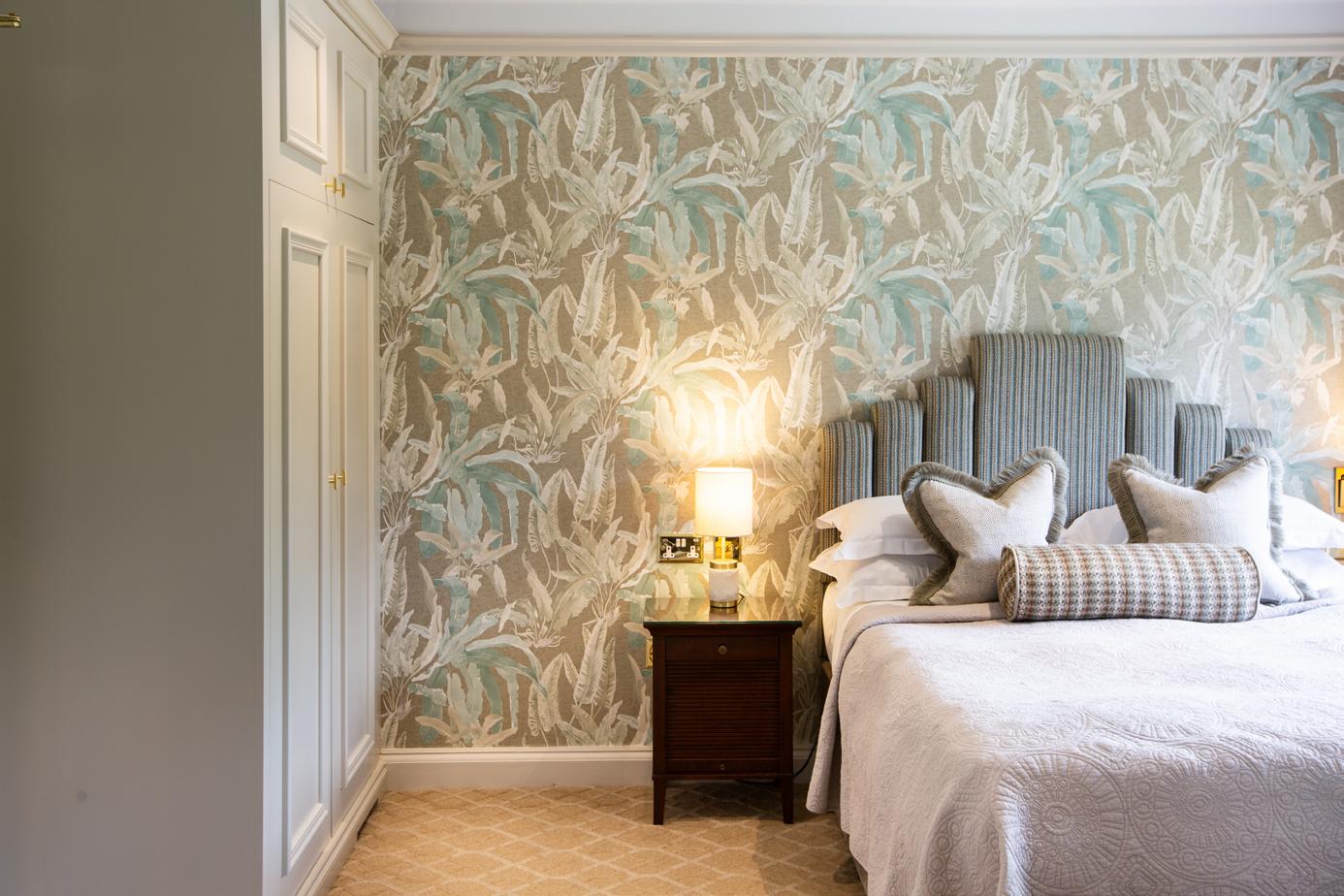
He describes Mallory Court as “a Grande Dame of quintessentially English hotels,” a phrase that captures its timeless elegance. His favourite view overlooks the gardens, orchard, and pond in the height of summer — a living portrait of the hotel’s enduring beauty.
The entrance drive, the terrace overlooking the fields, the gardens as they begin to flourish in spring — it never loses its magic.
“ “
With 37 years of service, Mandy is living proof of Mallory Court’s commitment to nurturing and developing its people.
Tara began in 2004 as Sales & Marketing Manager and is now Sales & Marketing Director for the Eden Hotel Collection. She still speaks with the same enthusiasm for Mallory Court as when she first arrived: “The entrance drive, the terrace overlooking the fields, the gardens as they begin to flourish in spring — it never loses its magic.”
Her journey reflects how Mallory Court not only builds exceptional careers but also inspires a deep, lasting connection to place.
Leadership with Vision — Mark Chambers
Arriving in 2006 as Director & General Manager, Mark Chambers became Managing Director just two years later.
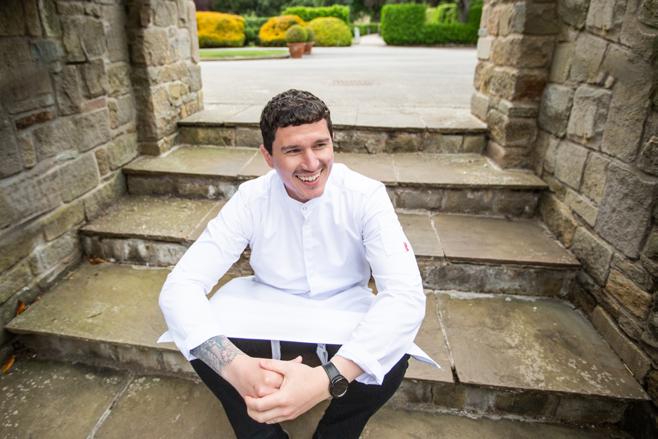
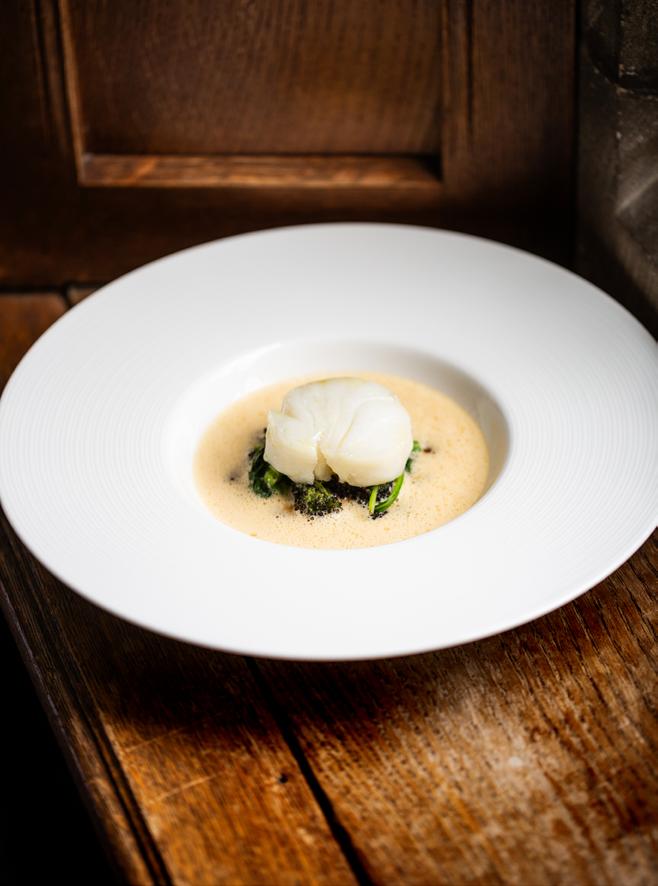
Mallory Court has also played a defining role in the career of acclaimed chef Stu Deeley, winner of MasterChef: The Professionals in 2019. Having honed his craft in Mallory Court’s kitchens early in his career, Stu has gone on to achieve national recognition and recently opened his own restaurant, The Warwick, bringing his award-winning culinary vision to the heart of Mallory Court. His story is a testament to how the hotel nurtures creativity, growth, and ambition within its own walls.
Together, these long-serving team members represent not just years of service, but a shared legacy of hospitality that continues to define Mallory Court. Their stories remind us that while beautiful grounds and elegant interiors set the stage, it is the people — their loyalty, passion, and pride — who give the hotel its soul.
Guests can expect a warm welcome from familiar faces, service rooted in genuine care, and an atmosphere that feels both timeless and personal. Whether strolling through the rose gardens in summer, dining on locally inspired cuisine, or unwinding in the award-winning Elan Spa, every stay is enriched by the dedication of a team who know the hotel — and its guests — inside out.
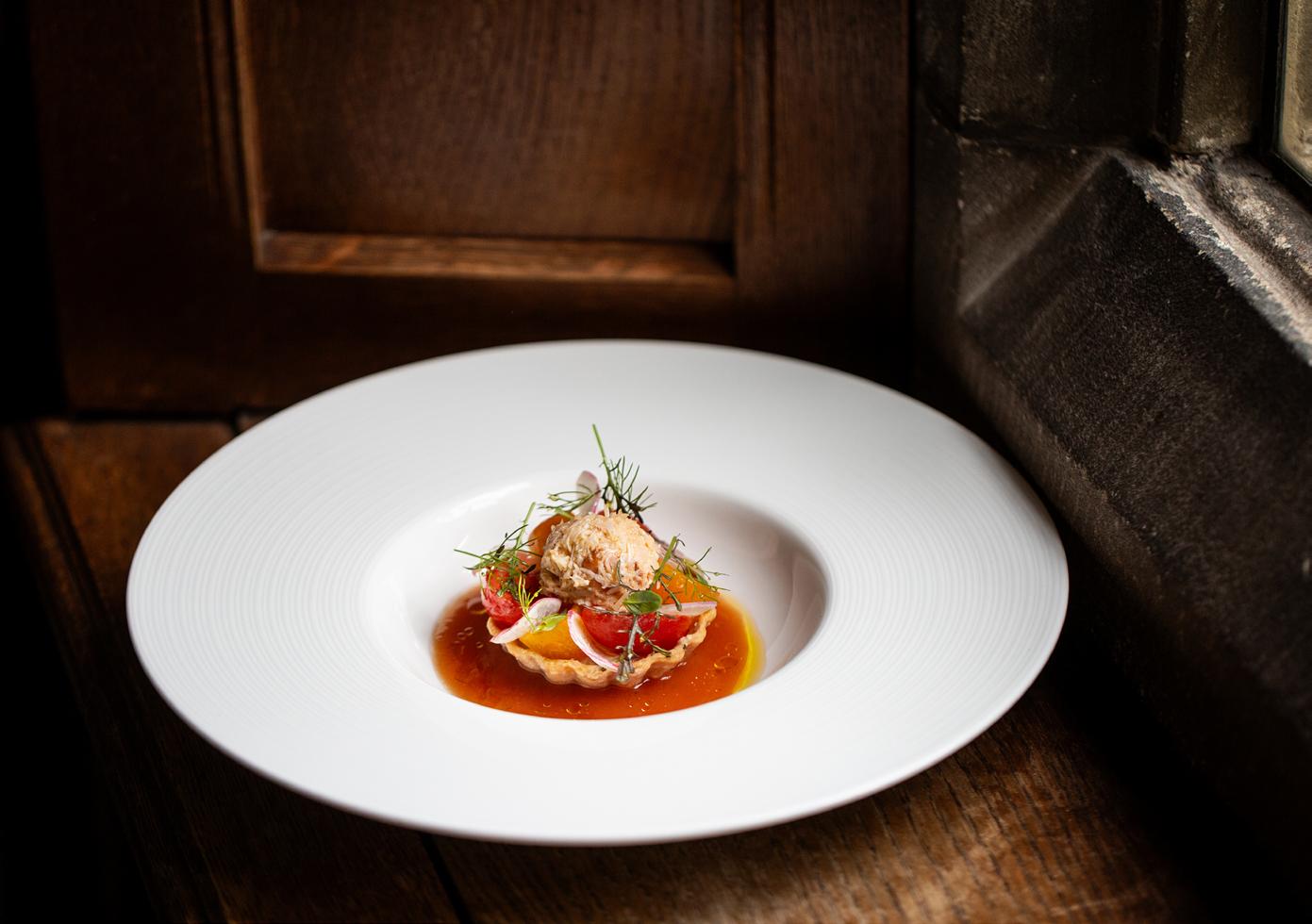
Nadine Hummert, founder of sustainable luxury lifestyle brand Equilibrium Lifestyle, explores how slow gifting is redefining the way we celebrate Christmas – and why it’s good news for people and the planet.
This festive season, the frenzied hunt for last-minute stocking fillers is giving way to a more considered approach: slow gifting. Thoughtful, sustainable, and often handcrafted, these gifts are chosen with intention, wrapped with care, and designed to be cherished long after the holiday season. From artisan creations to curated wellness experiences, slow gifting allows Christmas to feel meaningful, mindful, and luxurious.
Slow gifting focuses on presents that carry meaning and longevity. YouGov’s 2024 Christmas gifting report shows that over half of UK shoppers now plan their present buying weeks in advance, signalling a move away from last-minute shopping.


Instead of mass-produced items destined for landfill, slow gifting celebrates pre-loved treasures, artisan creations, and thoughtful experiences. Each gift tells a story, offering something unique, personal, and timeless.
Why Luxury Shoppers Are Embracing It
Several cultural shifts are driving this trend:
• Sustainability: Consumers increasingly seek gifts with a lower environmental footprint—long-lasting, eco-friendly items crafted with care.
• Personalisation: Bespoke artisan pieces or curated experiences are increasingly favoured over massproduced products.
• Mindful Planning: Early buying allows for considered choices rather than rushed, convenience-driven purchases.
• Generational Influence: Millennials and Gen Z are leading the way, favouring upcycled, artisanal, and preloved items that reflect individuality and purpose.
Hummert notes that this shift aligns naturally with luxury hospitality, where curated experiences—from wellness hampers and spa packages to bespoke stays—turn every detail into a memorable, intentional moment.
1. Pre-order for Peace of Mind
Skip the December rush by ordering gifts early. Many luxury brands offer elegant wrapping, personalised touches, and curated gift sets—perfect for presentation under the tree or in a hotel suite.
Avoid seasonal gimmicks. Opt for meaningful items designed to endure: a framed print capturing shared memories, artisan jewellery, or wellness bundles that inspire mindful routines into the new year.
3. Support Creativity & Craftsmanship
Buying from small businesses or artisans is about more than the product—it’s about the story, skill, and care behind it. Handmade ceramics, hand-poured candles, and upcycled accessories not only feel more personal but often come with eco-conscious packaging.
4. Add Everyday Luxury
Elevate the ordinary with indulgent touches. Thoughtfully curated collections of items that bring calm, comfort, and a hint of indulgence are ideal for loved ones who appreciate the finer details in life.
Hummert emphasises that slow gifting is about bringing intention and care back into the festive season. By selecting gifts thoughtfully, we create deeper connections with the people receiving them and contribute positively to the planet.
In luxury hospitality, this ethos extends beyond physical gifts to curated experiences that guests can enjoy and remember—turning each present into a moment that is both personal and extraordinary.
For seasonal inspiration, Equilibrium Lifestyle offers collections of artisan tote bags, cushion covers, and wellness gifts, all designed to embody the slow gifting ethos.
With venues already no doubt half booked up with festive parties throughout December, its important to start organising your Christmas theme now and Alliance Online are here to discuss the best festive trends this year.
The Classics
Obviously, it’d be remiss of us not to start with the classic colourways which dominate the festive period, we’ll start with the ever popular and present


Gold, Red and Green. These tones always feature in venues across the nation on account of them being the quintessential Christmas colours.
Staying with iconic looks, if Gold, Red and Green aren’t your thing you could go for the crisp, clean look of Silver and White. With the white imitating the coolness of Winter’s snow, the silver adds a tasteful hint of sparkle and glamour.
For a more refined and regal colour palette, navy and gold creates a striking contrast. We at Alliance predict this to be a huge trend this season, particularly in luxury venues. The deep midnight navy provides a dramatic and elegant stage to build your Christmas theme on.
If you and your business embrace non-mainstream themes, then this may be for you. Perfect for quaint, quirky establishments that stand out from the crowd this soft, fresh and airy colour



scheme creates a serene and inviting atmosphere.
At Alliance, we have taken the initiative to ensure our Christmas crackers are fully recyclable. This has been achieved by removing the powder (silver fulminate) from within the crackers which creates the classic crack. We have replaced this with the snapping sound of card instead meaning the fun can still continue, but the cracker can be disposed of afterwards via an environmentally conscious channel.
To review our Christmas offering you can contact us for a digital copy of our Christmas Catalogue, or contact your local Alliance depot who will be able to talk to you further surrounding Christmas and how we can help you be ready for the festive season.




A few decades ago, climbing the culinary ladder was almost an initiation rite: strict hierarchy, military discipline, and recognition from gastronomic guides. But this vertical vision of the profession is fading. Today, young talents reject the authoritarianism of traditional brigades.
According to a Deloitte study, 46% of Generation Z consider well-being and a sense of purpose at work more important than rapid career progression. The 21st century chef has become an intercultural manager, whose brigades bring together talents from around the world with different backgrounds and sensibilities. They must also navigate

new expectations: alignment with personal values, the search for meaning, and work-life balance. In a world where young professionals increasingly value collective experience over a meteoric career, the chef’s role is no longer to command but to unite, to transmit, and to inspire a shared vision.
In the dining room, clients too now expect more than just excellence on the plate; they demand tangible commitments, and an increasing number of consumers now consider product sustainability a decisive factor when choosing a restaurant. The chef thus becomes a societal actor, a custodian of shared values.
A brigade is a microcosm, a miniature enterprise with its own tensions, urgencies, and cultural differences. Leading a team of 20, 30, or even 50 people in this context requires more than culinary skill.
It calls for mastering what are often called soft skills:
• Communicating clearly under the pressure of service
• Reading emotions and detecting signs of discouragement
• Managing conflict without breaking cohesion
• Inspiring through example rather than authority
• Motivating individuals from diverse backgrounds
In culinary education, these dimensions were long considered secondary, yet today they are central to success. An exceptional dish is always the fruit of a collective effort, and that collective can only thrive if its leader has developed emotional intelligence as much as creativity.
But a chef’s role cannot be limited to management, as it is also deeply entrepreneurial. Opening a restaurant, defining a concept, attracting investors, and building a brand identity are all part of a chef’s reality.
A great chef is also a business leader. They must understand budgeting,

A brigade is a microcosm, a miniature enterprise with its own tensions, urgencies, and cultural differences. “ “
profitability models, and market dynamics. They must innovate not only in the kitchen but also in the guest experience, in how they collaborate with producers, and in their integration of digital and technological solutions.
Training chefs in these areas means giving them the tools to turn passion into a sustainable project. Without such preparation, many culinary ventures falter under economic pressure.
This is where schools have a decisive role to play. Education can no longer be limited to technical mastery; it must immerse students in real-world scenarios
where they simultaneously develop their culinary, managerial, and entrepreneurial abilities.
At École Ducasse, we have embraced this approach. Our students work on projects that expose them to the real dilemmas faced by today’s chefs:
• Building a multicultural brigade around a common menu
• Developing a realistic business plan for a sustainable dining concept
• Reflecting on ethical sourcing and waste reduction
• Speaking publicly to defend a culinary vision
Through such experiences, we cultivate true chef-managers, well-rounded individuals capable of creating, leading, and inspiring.
This movement goes far beyond gastronomy. In sports, in luxury, and in business, the same transformation is underway: leadership is no longer vertical but collaborative. High-performing organisations are those that combine
technical excellence with human intelligence.
This evolution aligns perfectly with modern theories of leadership, notably transformational leadership (James MacGregor Burns, Bernard Bass), which holds that a leader inspires and elevates their teams by giving meaning, embodying a vision, and fostering individual growth.
Applied to gastronomy, this approach redefines the chef’s role, no longer merely as a holder of know-how, but as a catalyst for talent, a transmitter of values, and a driver of collective engagement.
At École Ducasse, our conviction is clear: education must be the engine of this transformation, because tomorrow, a chef’s greatness will be measured as much by their ability to inspire as by their art of cooking.
Written by Karine Hyon Vintrou (pictured bottom left), Managing Director, École Ducasse

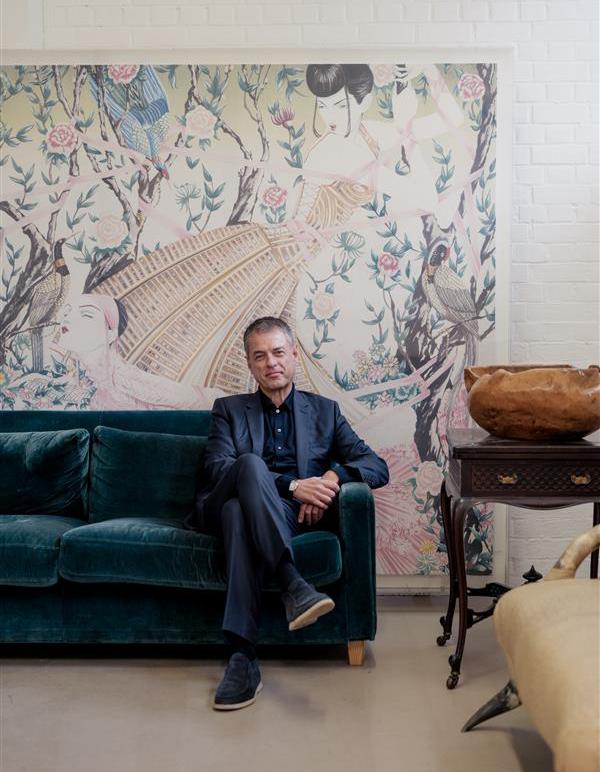
Since his appointment as General Manager of The St. Regis London, Marco Novella has been preparing for the grand debut of the landmark Mayfair hotel opening mid-2026.
Blending London’s rich heritage with the spirit of modern luxury, the hotel is set to offer a new culturally engaging home away from home for both global travellers and discerning Londoners alike.
Together with his team, Marco will infuse the worldrenowned St. Regis experience with creative energy— fostering connections with art and fashion while redefining bespoke service excellence by integrating the signature butler service at the very heart of Mayfair.
Marco Novella brings more than two decades of leadership in luxury hospitality, having held senior roles at some of the world’s most iconic hotels. Most recently, he served as Managing Director of Hotel Cipriani, A Belmond Hotel in Venice, part of the LVMH Group, from 2021 to 2024, where he led the property through a period of strategic growth and operational excellence. Prior to that, he was Managing Director of The Lanesborough in London from 2018 to 2021, overseeing all aspects of the hotel’s performance, service standards, and guest experience, further reinforcing its position among the city’s most prestigious destinations.
Opening mid-2026, The St. Regis London will be Mayfair’s newest luxury destination, located at the corner of Conduit and New Bond Street.
Ian Schrager, revered entrepreneur and hotel and nightlife pioneer, received the SevenRooms Icon Award at The World’s 50 Best Hotels 2025 Ceremony, an evening that recognizes best-in-class global hospitality, last night in London.
Credited as the founder of the boutique hotel movement, Schrager has spent the last five decades pushing boundaries and creating one-of-akind spaces with a disruptive “luxury for all” mindset, all while making an undeniable impact on popular culture
and the hospitality industry at large. Since the 1980s, he has consistently challenged the status quo through his ground-breaking work building iconic brands including Morgans Hotel Group, EDITION Hotels, and now PUBLIC, a cult-favourite brand built on four key pillars – great service, style, unique experience and fun.
Driven by his unrelenting ambition and hunger for innovation, Ian is poised to expand the PUBLIC brand beyond its NYC flagship to Los Angeles with the debut of PUBLIC West Hollywood
Ian Schrager, © Chad Batka
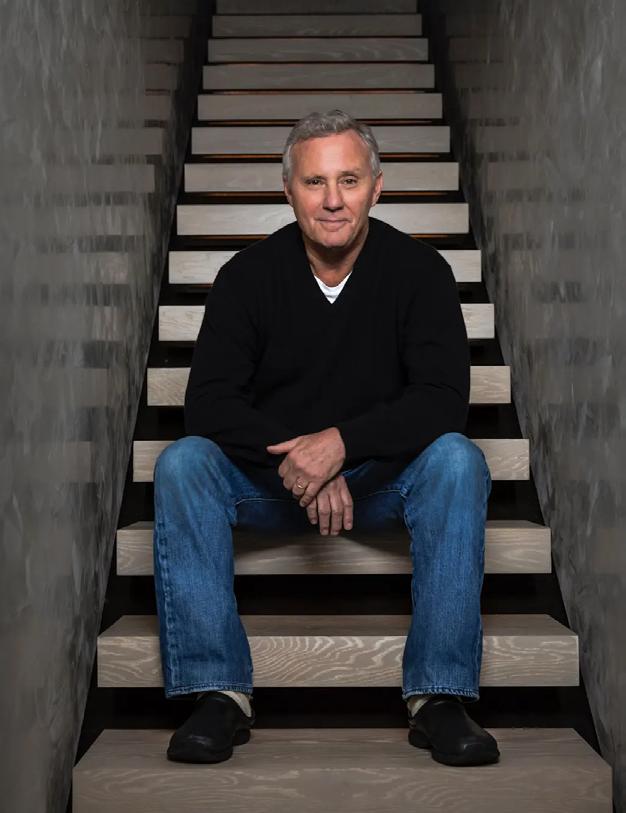
on the storied Sunset Strip in early 2026. Showcasing a new idea for a new age, the hotel will be situated within a landmark building with design executed by Schrager in partnership with British architect and frequent collaborator, John Pawson.

